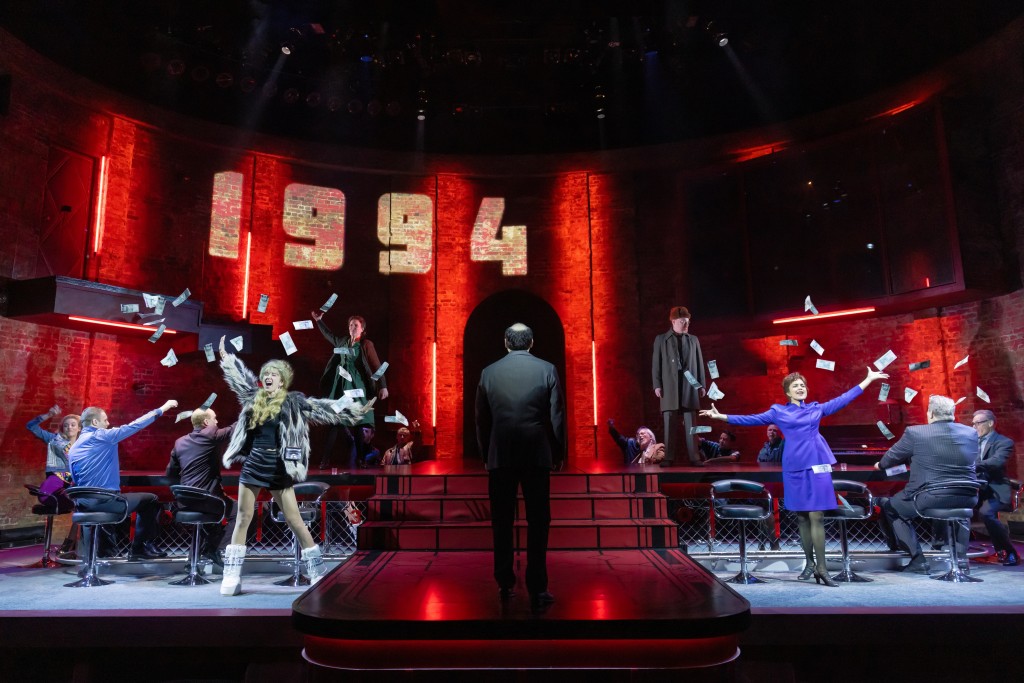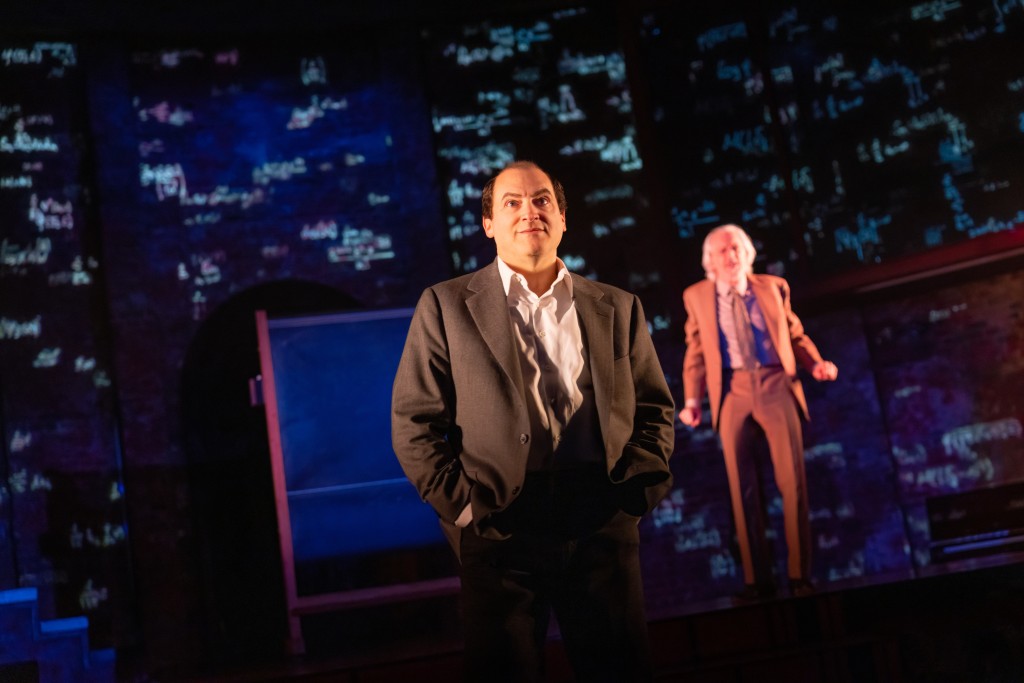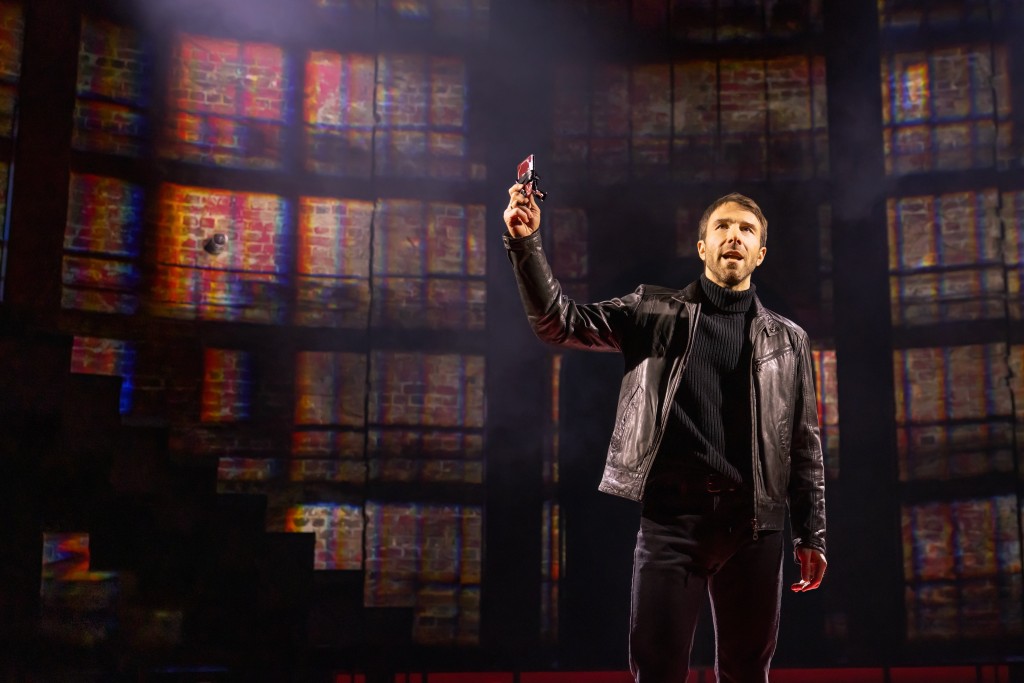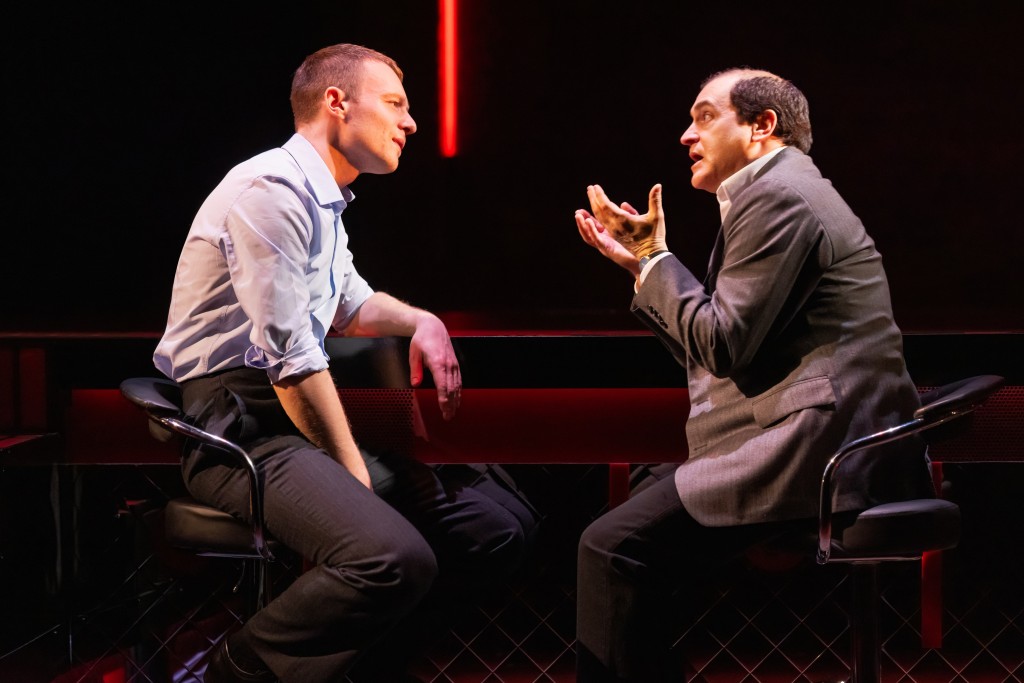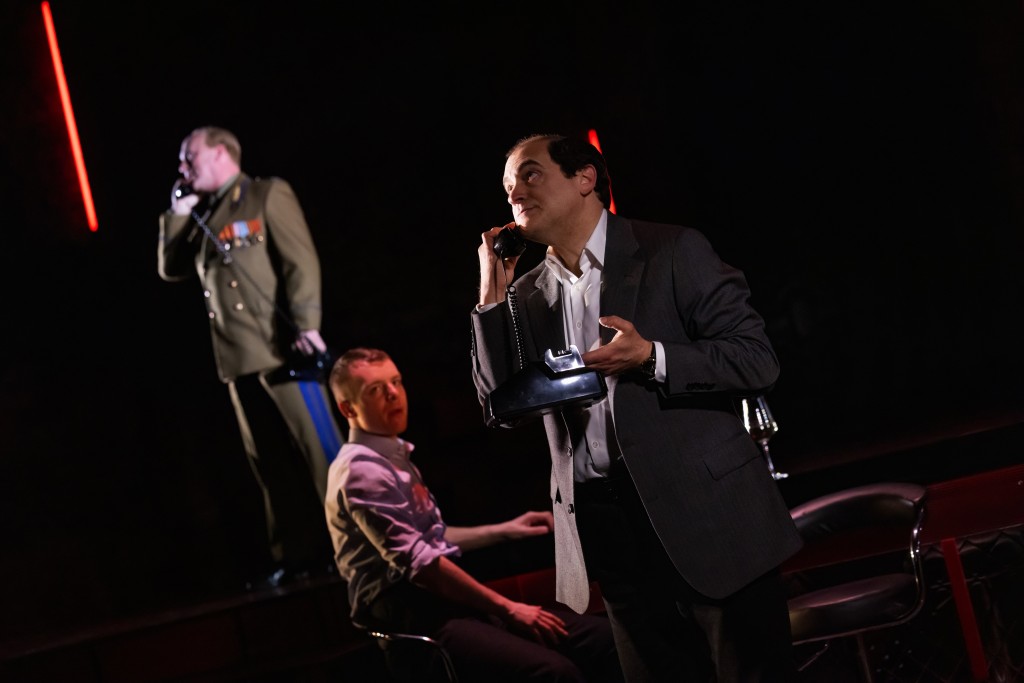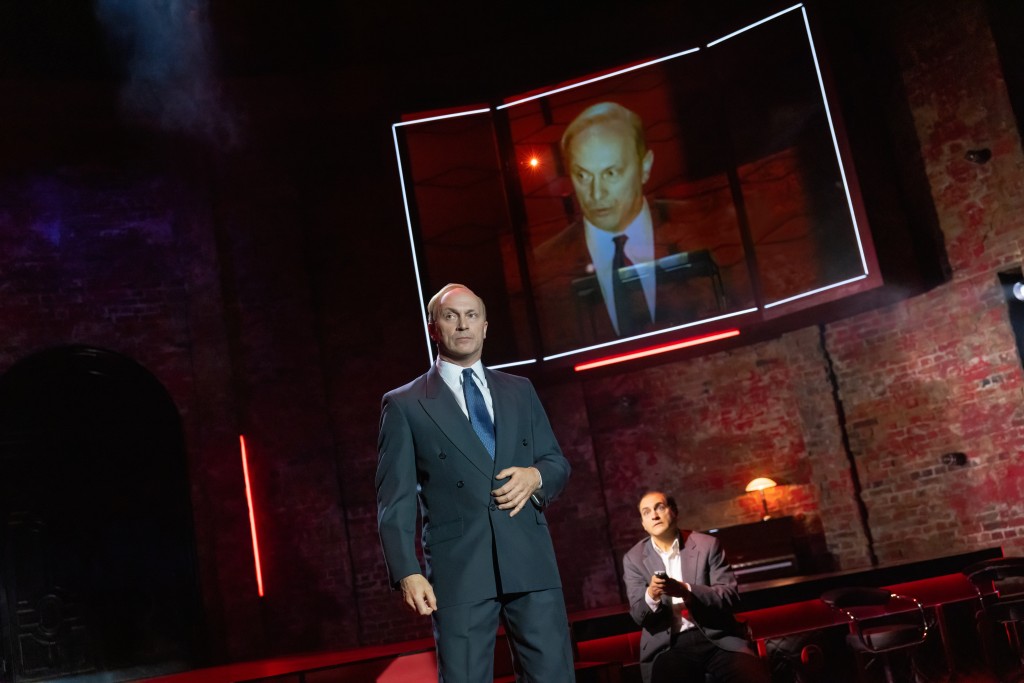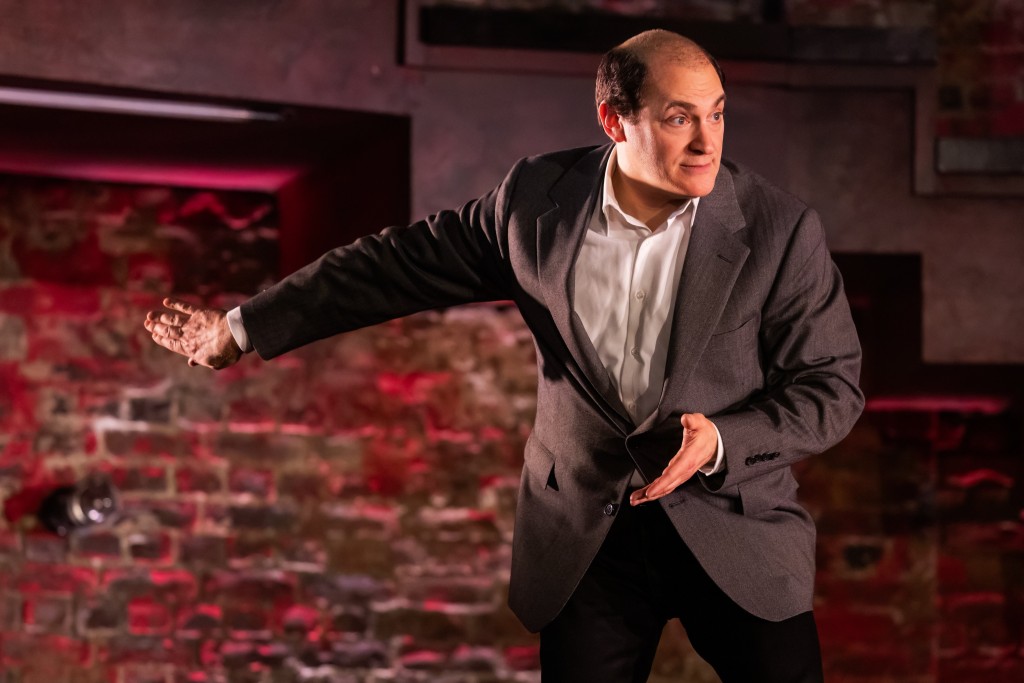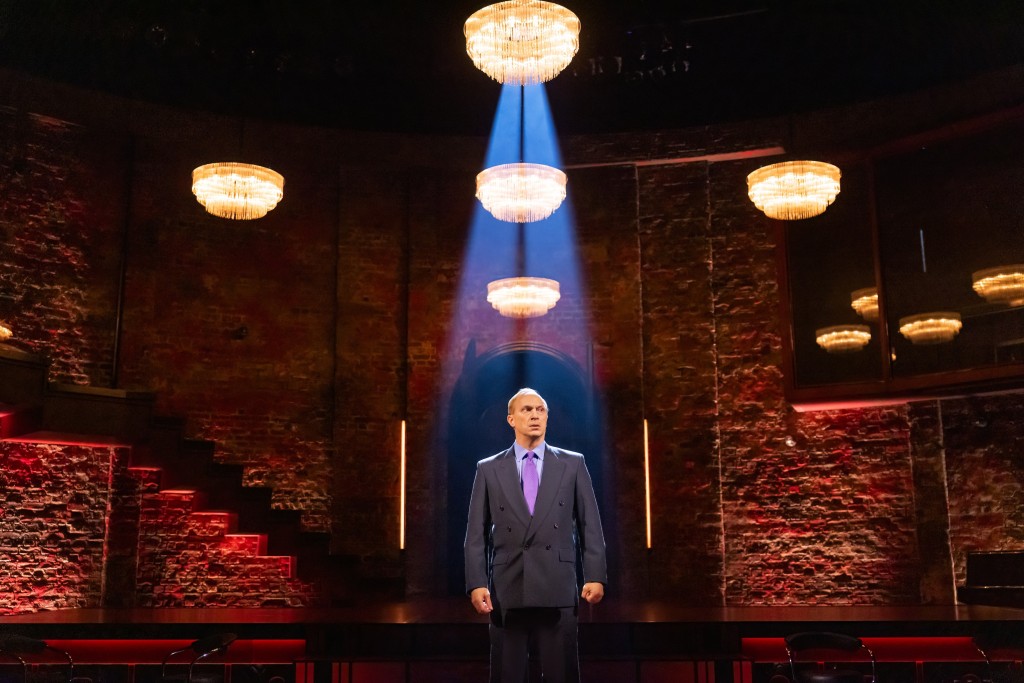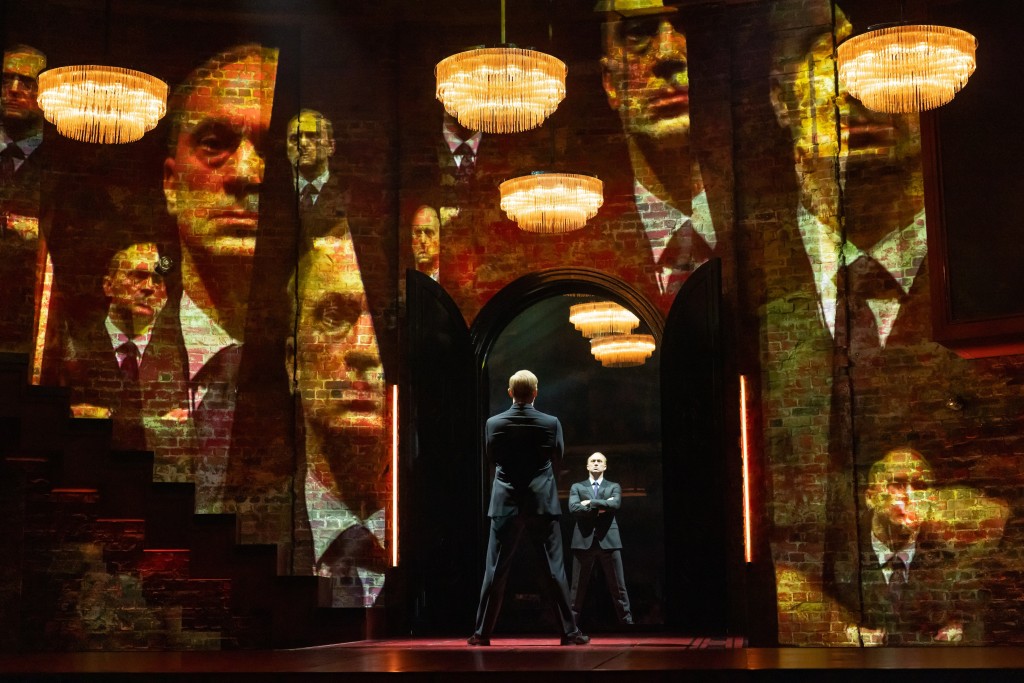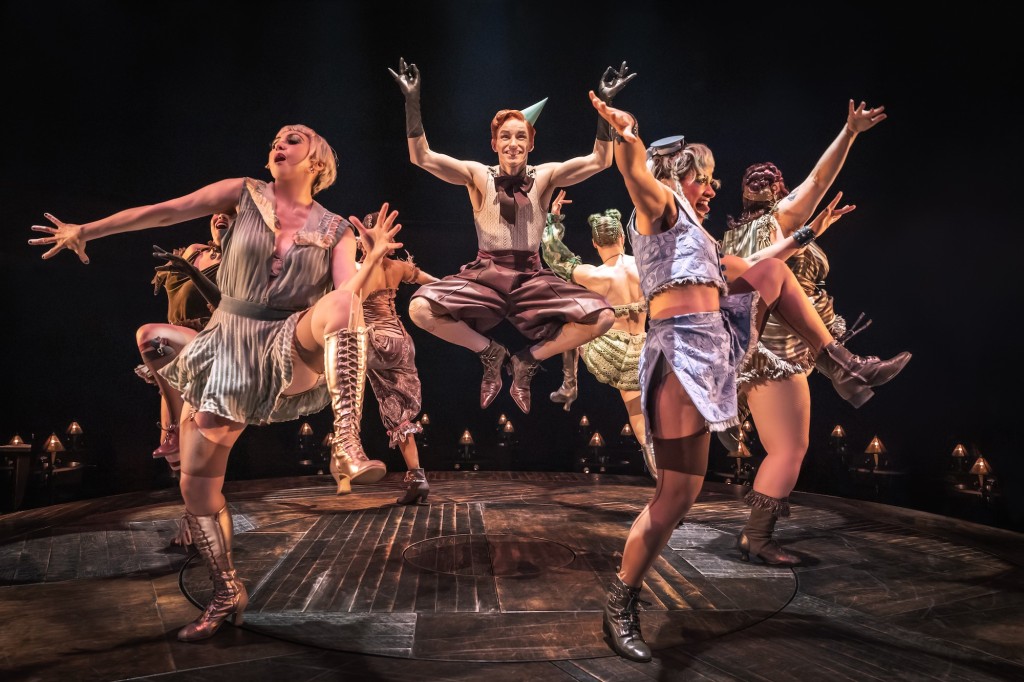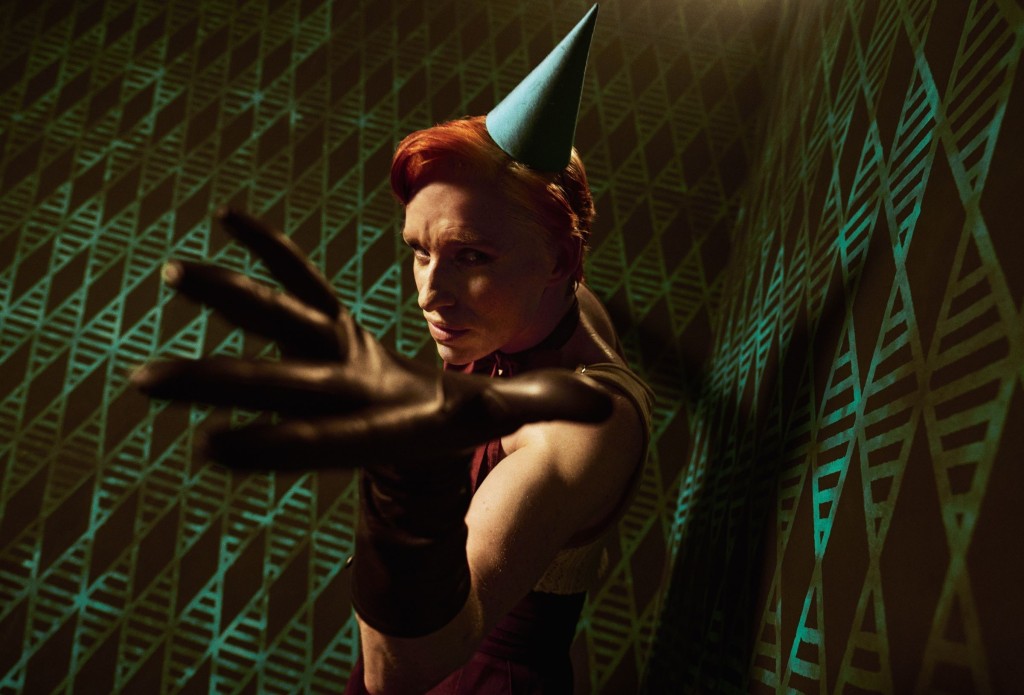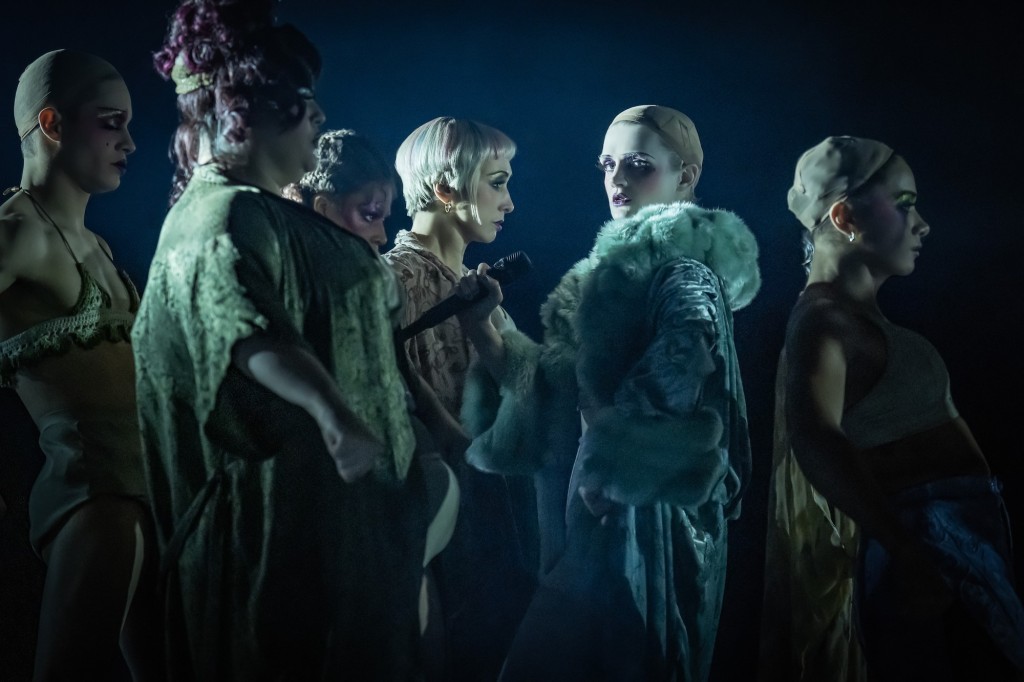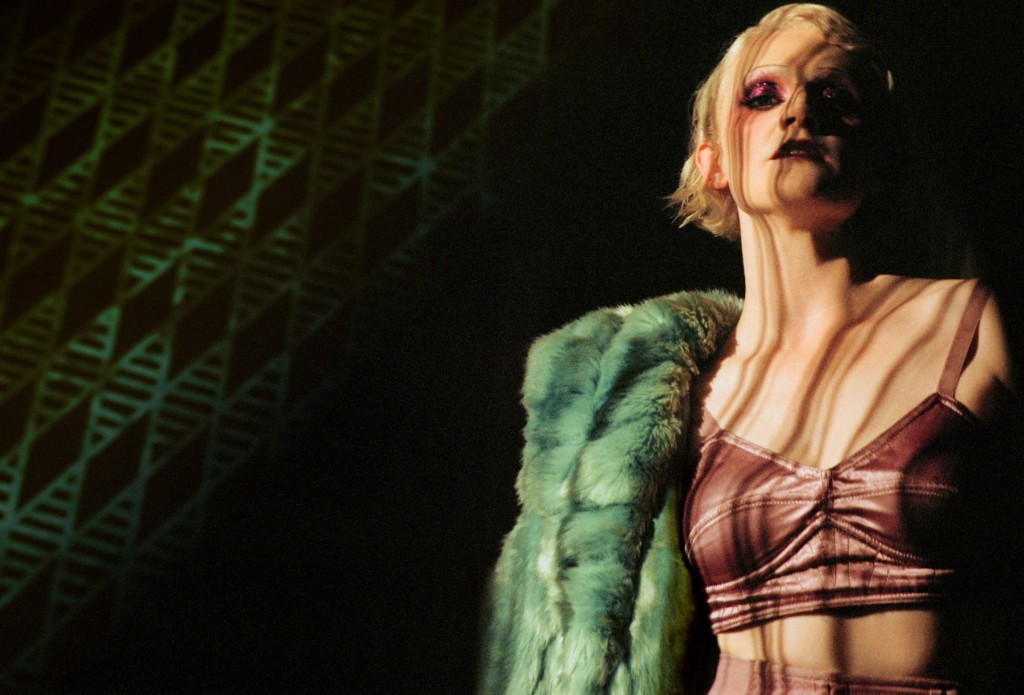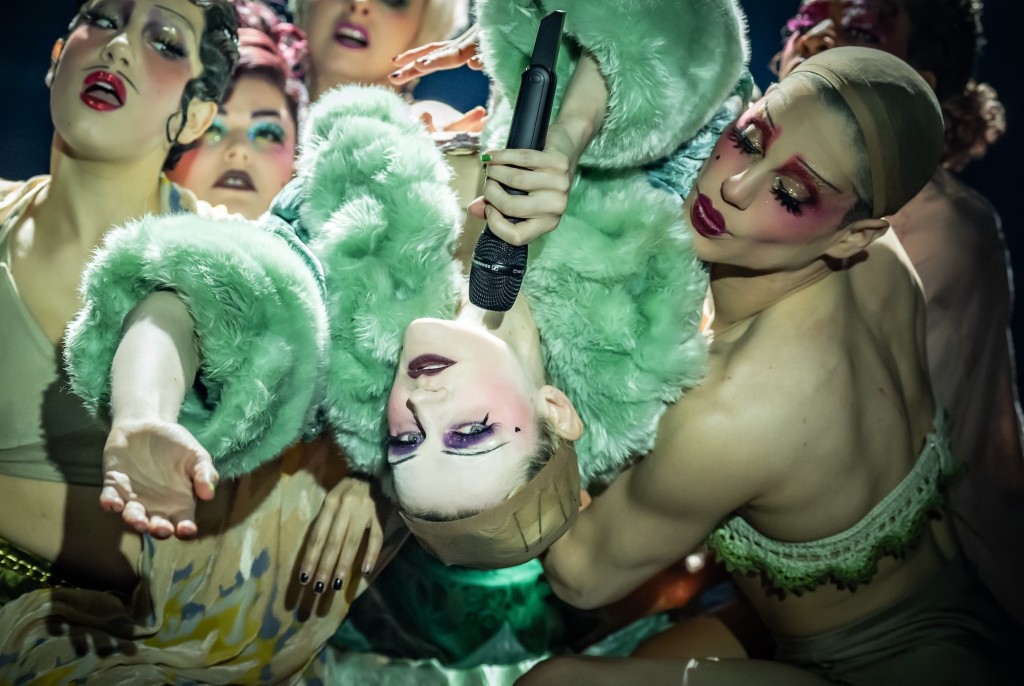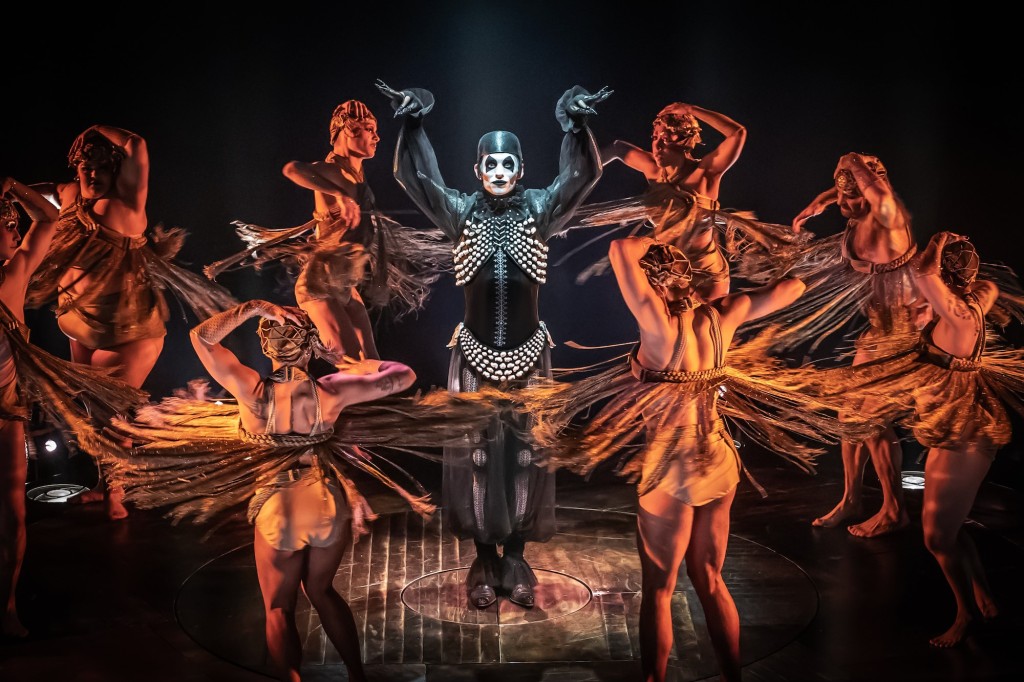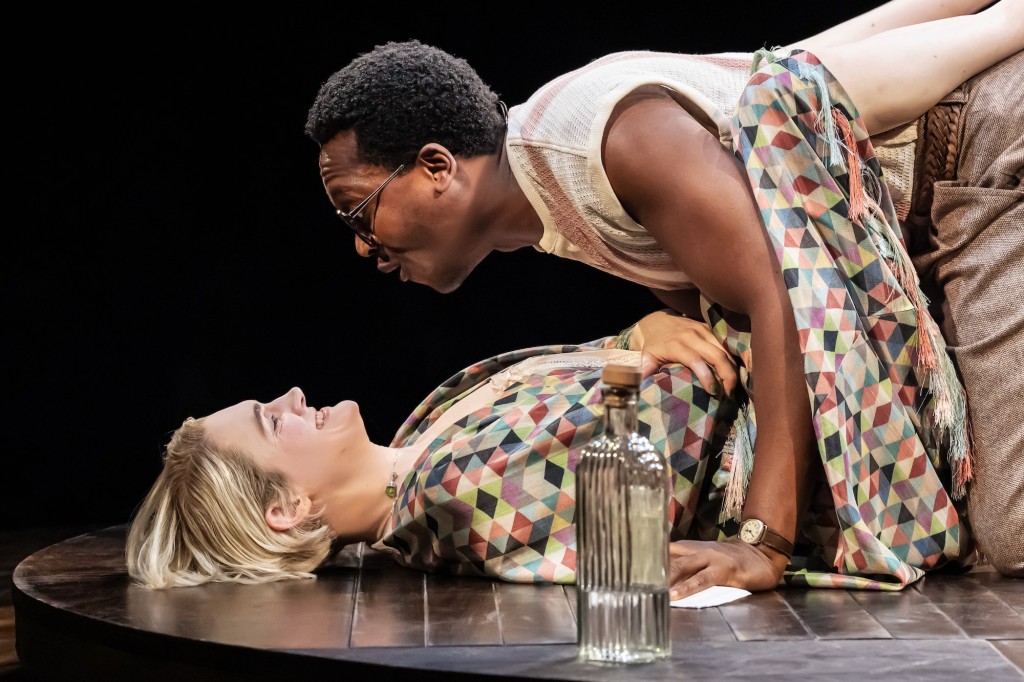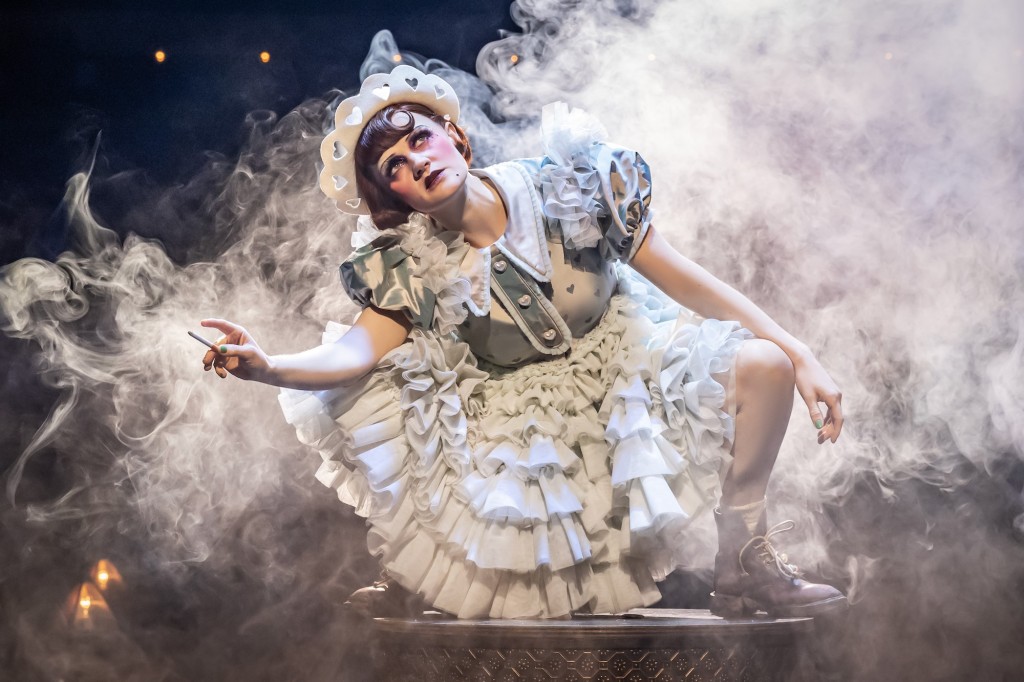Author Archives: caroleditosti
‘Staff Meal,’ Avant Garde, Experimental, a Review

In the notes from playwright Abe Koogler about Staff Meal, directed by Morgan Green, currently at Playwrights Horizons, Koogler hopes that the audience, “will emerge from it the way you might emerge from a transportive meal in an unusual restaurant in a part of town you’ve never been to before. The avant garde work, shrouded with a uncertainty is most interesting when there appears to be a linear forward movement among characters during vignettes of scenes which take place in Gary Robinson’s restaurant, that once was packed, but by the end closes down.
At the top of the play Ben (Greg Keller) and Mina (Susannah Flood), sit near each other in a coffee shop working on their laptops. Eventually, their proximity prompts them to become familiar with each other so after a number of days, saying “Hi,” and other chatty comments, they leave and seek better coffee and/or food elsewhere. The search leads them to Gary Robinson’s restaurant.
The rapport and pacing between Keller and Flood is enjoyable and funny by these talented actors. However, it ends when they get bogged down ordering from a waiter who takes an inordinately long period of time to take their order and bring back an excellent wine. In the interim, they take humorous and sobering flights of fancy about their personal lives which include some of the most imaginative dialogue in the play. However, when the waiter has not brought their food, then the scene shifts with the mood, and the focus becomes their waiter and his experience at the restaurant.

As a flashback of “The Waiter” segment begins, Ben and Mina leave “hanging in the air,” the thread of dialogue along with Ben’s story about his dog, whom his parents mistreated during the time he lived with his family in Spain. Hampton Fluker is the waiter who enters the spotlight. He discusses his time at the restaurant joined by other members of the wait staff (Jess Barbagallo, Carmen M. Herlihy), and chef Christina (Erin Markey), who serves them their delicious “staff meal” before they begin the evening’s service. Fluker’s waiter declines the meal at this point because it is his first day and he is afraid he will throw up out of nervousness.
What is striking about this vignette is that Christina doesn’t come up with ordinary food for the staff, but serves them extraordinary dishes following the philosophy of Gary Robinson, who emphasizes the importance of being of service to others. As one of the servers affirms, “Our power, our glory increases only so much as we give it away, constantly, only so much as we serve.” This is akin to a Biblical verse which implies, if one would be a great leader, one must be great at serving others. This philosophy is the antithesis of that practiced by politicians who serve themselves first, last and always, a virus that has particularly attacked the former Republican Party known as the Trump MAGAS.

However, like fragments of wisdom and truth which filter in and out of our consciousness, this conversation among the staff as they eat Christina’s delicious food and reference two of Gary Robinson’s books, dissolves into the air, though it is a profound concept that is incredibly current. However, one of the reasons why this wisdom and the astute servers’ conversation comes to a screeching halt is that an audience member interrupts with an important question, akin to “What the hell?”
By this point in time, the fourth wall has been broken twice; first by a vagrant (Erin Markey), who attempted to steal Mina’s laptop, though Mina elicited the help of an audience member to watch it for her when she went to the bathroom, because Ben wasn’t there that day. Luckily, Mina interrupts The Vagrant’s theft and sends her away without the laptop as Mina chides the negligent audience member, who was obedient to the playwright and didn’t tell The Vagrant, “Stop thief!”

The second breaking of the fourth wall is by a disruptive “audience member” (the fine Stephanie Berry), who is “annoyed” and questions the direction of the play defining it as meaningless, unrelated to her life, not current-when the world is burning down, and a waste of the gift of the audience’s time. Joining the other actor/servers onstage, she then discusses what she considers meaningful, her life, and the direction it has taken recently.
Of course, this is humorous and gives way to the notion that audience members’ opinions don’t always jive with theater professionals, though they can make or break them via word of mouth recommendations. Then the playwright forestalls audience opinions about his avant garde, surrealistic, weird work, using Berry as a a mouthpiece when the playwright has her say, “Do you ever get this feeling with young writers, or early writers, writers who are developing….do you ever wonder: when will they develop?” Berry’s audience member excoriates the quality of the play, Staff Meal, addressing the characters and absent playwright before sharing what is relatable to her in her life.

On consideration this surreal vignette works because of Berry’s authentic, spot-on performance which is confessional and makes us empathize with her even more so than with the other vignettes. But then she leaves and Koogler picks up where he left off back to the servers discussing the dwindling clientele and whether or not Robinson is going to close the restaurant down.
Then time and space shift once more. At this point, the servers and the couple have disappeared and the vignette with The Vagrant (Erin Markey) occurs. She explains that she takes on three roles, one of which is the chef, but the segment of The Vagrant involves her living in a hole and trying to acquire laptops so that she can get a job. Ah ha! We have the explanation of The Vagrant attempting to steal Mina’s laptop early on in the play. Eventually, she goes for a job interview and is hired and tells us she lived an extraordinary ordinary life and concludes with her affirmation that the rest of the play is about “how it ended.”

Berry’s audience member returns, warning us that she has been found out to be an artifice, and her role in the play is over, but she notices the weather outside is shifting and becoming ominous. The time has shifted once more and events move toward an unsettling conclusion. However, we do find out what happened to Ben’s dog, after they leave the restaurant without their food or wine. The waiter receives a delectable “staff meal,” Ben and Mina are separated walking home, and The Waiter is left questioning if Christina is still in the restaurant.
At this juncture it’s time to reconsider the audience member/playwright twitting himself about what he’s written. However, the play is more naturalistic in its chaotic, unthreaded, seeming randomness with bits of profound meaning stuffed here and there, like life, perhaps. In that we realize that we make meaning from our own lives, as random and strange as events can sometimes be, which have no rhyme or reason. Indeed, a fictional play with a neat beginning, middle and ending is easy to follow, but is perhaps easily dismissed as fiction. Staff Meal, as surreal as it is, is darkly memorable.

To assist with the sets which dissolve away to a bare stage, Jian Jung’s minimalist scenic design creates a cafe, a kitchen, a restaurant dining room and the dark ominous streets. Additional kudos go to Kaye Voyce’s simple (costume design), though I thought the elaborate costume for The Vagrant was interestingly layered with various “stuff.” Masha Tsimring (lighting design), kept segments toward the end foreboding, and Tei Blow (sound design) and Steve Cuiffo (illusion design), executed Morgan Green’s vision for Staff Meal.
Staff Meal will keep you guessing and wondering and perhaps as annoyed as Stephanie Berry’s Audience Member, trying to find the portal to understanding what’s beyond this unusual restaurant that serves its staff better than its customers. It runs with no intermission at Playwrights Horizons, Peter Jay Sharp Theater, 416 West 42nd Street. https://www.playwrightshorizons.org/shows/plays/staff-meal/
‘The Great Gatsby,’ Sumptuously Re-imagined, A Must-See, Unforgettable Broadway Spectacle

The Great Gatsby by F. Scott Fitzgerald is an iconic American novel set during the Jazz Age. It is about class, the privilege of old wealth and the excesses of the nouveau riche, who can never attain the status of the generational moneyed class, regardless of how hard they try. The Great Gatsby a New Musical, based on the titular novel, retains this key theme of America’s class system from the perspective of unreliable narrator Nick Carraway (Noah J. Ricketts). Carraway memorializes Jay Gatsby, the extraordinaire, whose ability to distill hope and materialize his dreams achieves its own artistic perfection. Examined from the perspective of Nick Carraway (Noah J. Ricketts), the tragic flaw in Gatsby’s process is that he attaches his hope to the imperfection of love and a woman who wasn’t worthy of his vision, faith or love.

The Great Gatsby, a New Musical made its premiere at the Broadway Theatre after its fall run at the Paper Mill Playhouse in New Jersey. With book by Kait Kerrigan in her Broadway debut, music by Jason Howland (Paradise Square), and lyrics by Nathan Tysen (Paradise Square), the musical is suprbly choreographed by Dominique Kelley and acutely directed by Marc Bruni (Beautiful: the Carole King Musical). Overall, it’s a gorgeously conceived production with exceptional ensemble work and flamboyant spectacle that sumptuously re-imagines the distinctive settings, individualistic characters and seminal events that make the novel a singular and timeless classic.

The strength of this production is that Kerrigan, Howland and Tysen are loyal to Nick’s perception of the magnificent Jay Gatsby, portrayed exquisitely by Jeremy Jordan. Jordan’s luscious, exceptional voice, Gatsbyesque persona, and passion do justice to Howland and Tysen’s lyrical and dynamic songs, “For Her,” “Past Is Catching Up to Me,” and the duet “Go.” We empathize with Jordan’s Gatsby, whose near divine love of Daisy (the lovely Eva Noblezada), never fails him, though Daisy can’t handle the irrepressible and divine nature of his efforts to transform time.
In “My Green Light,” an extraordinary duet between Noblezada and Jordan at the end of Act I, the couple consummates their love in Gatsby’s lavish bedroom with the projection of the rippling Long Island Sound at night, and the green light at the end of Daisy’s dock twinkling behind them in the background.

Bruni’s phenomenal staging, Paul Tate DePoo III’s projection and set unifies the key elements of the love relationship between Gatsby and Daisy, the artistry of Gatsby’s vision and his infinite hope (symbolized by the green light), driving it. The acting talents of Jordan and Noblezada, their lustrous singing and the setting are dazzling in this memorable, uplifting scene, where Gatsby, indeed, for a moment conquers time.

At that point we believe that Gatsby’s love is enough to hold Daisy and take her away from the craven, brutish, hypocritical Tom, who breaks his mistress Myrtle’s nose (Sara Chase), and manhandles Daisy leaving bruises on her arms during their quarrels. We believe like Nick and Jordan (the adorable Samantha Pauly), that Tom doesn’t deserve Daisy. However, by the conclusion of the musical, Nick realizes that Tom and Daisy do deserve each other. She won’t even attend Gatsby’s funeral, acting like he never existed. We agree with Nick that Gatsby is “worth the whole damn bunch put together.”

As Nick spins it, the tragedy lies in Daisy’s soulish weakness and her inability to live up to Gatsby’s love to “forget the past,” which he asks her to do in front of Tom in the superbly acted scene at the Plaza Hotel. Together the characters sing the sensational ensemble number “Made to Last.” John Zdrojeski’s Tom is particularly cruel as he arrogantly denounces Gatsby, his criminal bootlegging and his low class background. The lyrics are profound and spot-on. The dynamic music reinforces the themes which the characters forcefully embrace and symbolize. Tom sardonically sings, “It’s not about wealth, it’s blood. It’s class. The day you were born, your die had been cast.” And Gatsby insists, “Daisy, tell him you’re through.” And he tells Tom to “face reality,” affirming that Daisy never loved Tom.

During the explosive turning point in the song, Gatsby insists she renounce her marriage to Tom, and in effect her position and class to which Tom “elevated” her. When Tom sees she falters, that she honestly admits that she loved them both, and that Gatsby “wants too much,” Tom feels secure. He knows she is too weak and insecure to leave him and their daughter. Noblezada’s Daisy, Zdrojeski’s Tom and Jordan’s Gatsby strike the mixture of emotions of their characters with authenticity and power. Daisy’s heightened angst and tenuous state of mind force her to leave the suite, with Gatsby running after her. It is not a position of power from which Gatsby might redeem himself with her, though he tries.

Tom’s defamation and insults to Gatsby’s face and the reality of what Daisy would be giving up to leave him dislocates Daisy to distraction and ultimately causes the fatal accident and final tragedy of the underclasses, who make the mistake of becoming involved with the soulless, unimaginative upper class.

Noblezada portrays Daisy’s confusion with grist, making Jeremy Jordan’s desperation to stop Tom’s brainwashing and win her back even more pronounced. When Tom’s words hit their mark, it’s as if a curtain shuts down Daisy’s mind. Jordan’s Gatsby sees the impact of Tom’s cynicism as it disintegrates all the romance of what he has accomplished in order to turn back time to the fullness of Daisy’s love when Tom never existed. The scene is the brilliant high-point. What follows is the aftermath from which there is no recovering, except that Nick must lead the musical encomium to the greatness of his friend Gatsby. He alone fully grasps who the man was, so of course, he is furious that the papers slam Gatsby and further drive Daisy into oblivion and Tom into victory, as they jaunt away to Hawaii.

Kerrigan, Howland and Tysen are faithful to the key events in the novel down to no one going to Gatsby’s funeral except Nick which Bruni simply stages with black curtains, the casket and bier and red roses. Howland and Tysen fill out Wilson’s mania as he assassinates Gatsby, after Tom sets him up (“God Sees Everything”). As Gatsby sings the reprise “For Her” and Nick imagines how it happens, Wilson joins in and asks God’s forgiveness for using his hands to met out justice and take responsibility for the execution. Of course, Wilson’s ask is ridiculous as his justice is misplaced. Duped by Tom to do violence and pay for it with his own life, Wilson is a pathetic figure. Reflecting on these events, and Daisy and Tom’s nonchalance about Gatsby and the Wilsons, Carraway disdains Daisy and Tom as representative of the careless rich who destroy people and things leaving the Nick Carraways of the world to clean up the mess.

Comedic elements are found in this adaptation which sometime diffuse the impact of the story, as does attention to the secondary characters who are given greater focus. It is also problematic that Nick’s perspective doesn’t cohere throughout the musical, but leaves off in a few scenes, one between Jordan and Daisy.

Some of the comedy is refreshing as in the scene Nick and Jordan share at Nick’s cottage while Daisy and Gatsby meet for the first time in five years. Their relationship is expanded beyond the novel when Jordan and Nick’s intimacy gives way to his proposal of marriage which she is on the verge of accepting, though in Act I she is against marriage. Her characterization is more in keeping with today’s women than women of the early 20th century. Nick’s characterization is largely faithful to the novel. Noah J. Ricketts does a fine job of rendering Nick the unreliable narrator who thinks highly of himself, but doesn’t completely stand up to Tom and Daisy. Instead, he turns tail and runs back to the Midwest away from the” “evil” East, an irony. The only way he can reconcile his self-loathing about his behavior is to attempt to expiate his guilt by memorializing Gatsby.
The Jordan/Nick scenes are humorous and flirtatious. Their number “Better Hold Tight” is a diversion more for its own sake. However, we are not surprised that Nick throws over Jordan who doesn’t show up to Gatsby’s funeral either. She is one of the bad drivers, the careless rich who sicken and disgust him, for they dupes the fools who would seek the dream “boats running against the current” (“Finale: Roaring On”), to only to stumble because their dreams are behind them in the past.

Kerrigan, Howland and Tysen take even greater liberties with the secondary characters for the sake of dramatic purposes. Kerrigan, et. al. strengthen and coalesce the ideas symbolizing George Wilson (Paul Whitty), George’s wife Myrtle (Sara Chase), and Meyer Wolfsheim (Eric Anderson), by giving each of them solo numbers which define their personalities, desires and attitudes. These add to the themes, though they refocus the thrust of Nick’s story of how Gatsby is a romantic hero. The mystery surrounding Gatsby’s identity which is slowly revealed in the novel, is lost in this musical with attention going elsewhere.

As a representative of the criminal class that feeds the dreams of the lower class, breaking the law to do so, thug Wolfsheim joins the company singing “New Money,” which old wealth (Tom), regards as garish and meretricious. Anderson’s Wolfsheim (“who made Gatsby”), also sings and joins the company dancing in the excellent number “Shady.” As Wolfsheim sings, Bruni stages vignettes with each of the character couples being corrupted in their adultery or “sinful” affairs (Jordan and Nick, Gatsby and Daisy, Tom and the Wilsons). According to Wolfsheim, “I’m okay with keeping secrets. I’m okay with being naughty. I approve of indiscretions, if you know how to hide a body.”

Eric Anderson and cast of The Great Gatsby (Matthew Murphy and Evan Zimmerman)
Read the rest of this entry
‘Uncle Vanya,’ Steve Carell in a Superb Update of Timeless Chekhov
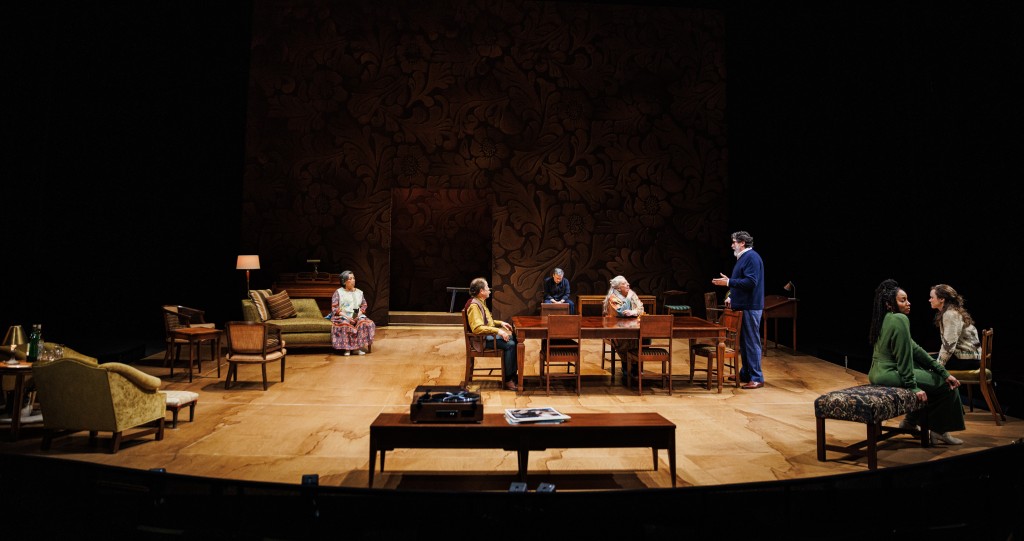
A favorite of Anton Chekhov fans is Uncle Vanya because it combines organic comedy and tragedy emerging from mundane, static situations, intricate, suppressed characters and their off-balanced, mired-down relationships. Playwright Heidi Schreck (What the Constitution Means to Me), has modernized Vanya enhancing the elements that make Chekhov’s immutable work relevant for us today. Lila Neugebauer’s direction stages Schreck’s Chekhov update with nuance and singularity to make for a stunning premiere of this classic at Lincoln Center’s Vivian Beaumont in a limited run until June 16th.
With a celebrated cast and beautifully shepherded ensemble by the director, we watch as the events unfold and move nowhere, except within the souls of each of the characters who climb mountains of elation, fury, depression and despair by the conclusion of this two act tragicomedy.
Schreck has threaded Chekhov’s genius characterizations with dialogue updates that are streamlined for clarity, yet allow for the ironies and sarcasm to penetrate. At the top of the play Steve Carell’s Vanya is hysterical as he expresses his emotional doldrums at the bottom of a whirlpool of chaos which has arrived in the form of his brother-in-law, Professor Alexander (the pompous, self-important Alfred Molina in a spot-on portrayal), and Alexander’s beautiful, self-absorbed, younger-by-decades wife Elena (Anika Noni Rose). Also present is the vibrant, ironic, self-deprecating, overworked Dr. Astrov (William Jackson Harper), a friend who visits often and owns a neighboring estate.

During the course of the first act, we are witness to the interior feelings and emotions of all the characters who in one way or another are bored, depressed, miserable and disgusted with themselves. Vanya is enraged that he has taken care of Alexander’s lifestyle, even after his sister died in deference to his mother, Maria (Jayne Houdyshell). He is particularly enraged that he believed with is mother that Alexander was a “brilliant” art critic who deserved to be feted, petted and over credited with praise when he lived in the city.
Having clunked past his prime as an old man, Alexander has been fired because no one wants to read his work. He and Elena have run out of money and are forced to stay in the family’s country estate with Vanya and Sonia, Alexander’s daughter (the poignant, heartfelt Alison PIll), away from the limelight which shines on Alexander no more. Seeing Alexander in this new belittlement, though he orders around everyone in the family, who must wait on him hand and foot, Vanya is humiliated with his own self-betrayal. He didn’t realize that Alexander was a blowhard who duped and enslaved him to labor on the farm to supporting his high life, while he pursued his “important” writing. Vanya and Sonia labor diligently to make sure the farm is able to support the family, though it has been a difficult task that recently Vanya has grown to regret. He questions why he wasted his years on a man unworthy of his time and effort, a fraud who knows little about art.
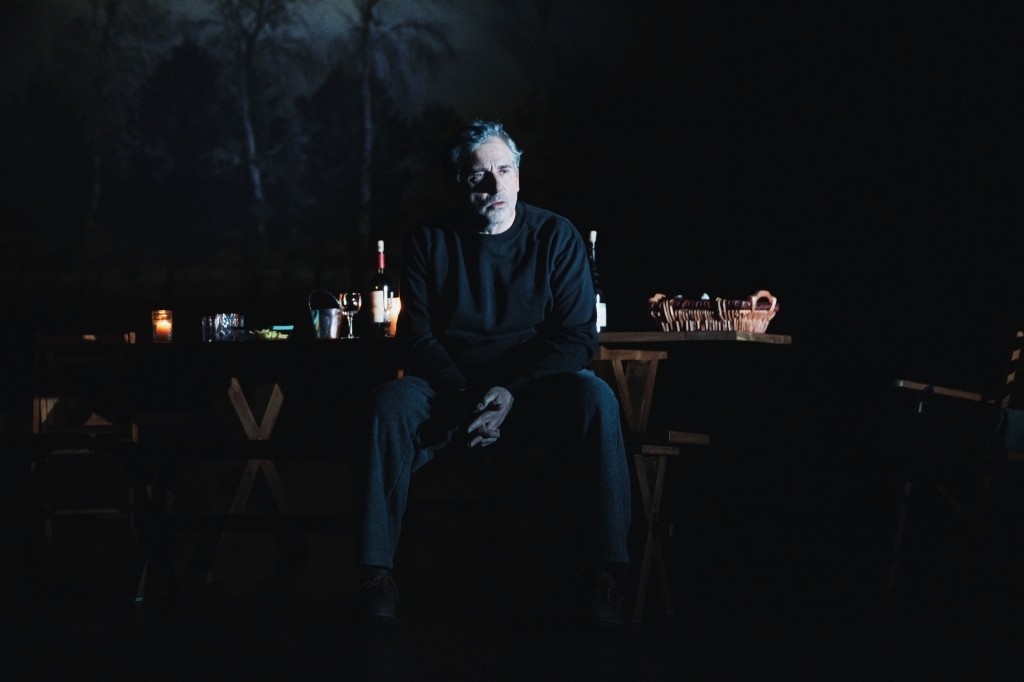
Likewise, Astrov questions his own position as a doctor, admitting to Marina (Mia Katigbak), that he feels responsible for not being able to help a young man killed in an accident. To round out the “les miserables,” Alexander is upset that he is an old man who is growing more decrepit by the minute as he endures believing his young, beautiful wife despises him. Despite his upset, Alexander expects to be waited on by his brother-in-law, mother-in-law and in short, everyone on the estate, which he has come to think is his, by virtue of his wanting it. Though the estate has been bequeathed to his daughter Sonia by Vanya’s sister, his first wife, Alexander and Elena find the quiet life in the country unbearable.
As they take up space and upturn the normal routine of the farm, Elena has been the rarefied creature who has disturbed the molecules of complacency in the lives of Vanya, Sonia and Astrov. Her beauty is shattering. Sonia hates her stepmother, and both Vanya and Astrov fall in love and lust with her. As a result, their former activities bore them; they cannot function with satisfaction, and have fallen distract with want, craving the impossible, Elena’s love. Alexander fears losing her, but realizes if he plays the victim and harps on his own weaknesses of old age, as distasteful as he is, Elena is moral enough to attend to him, though she is bored and loathes him in the process.
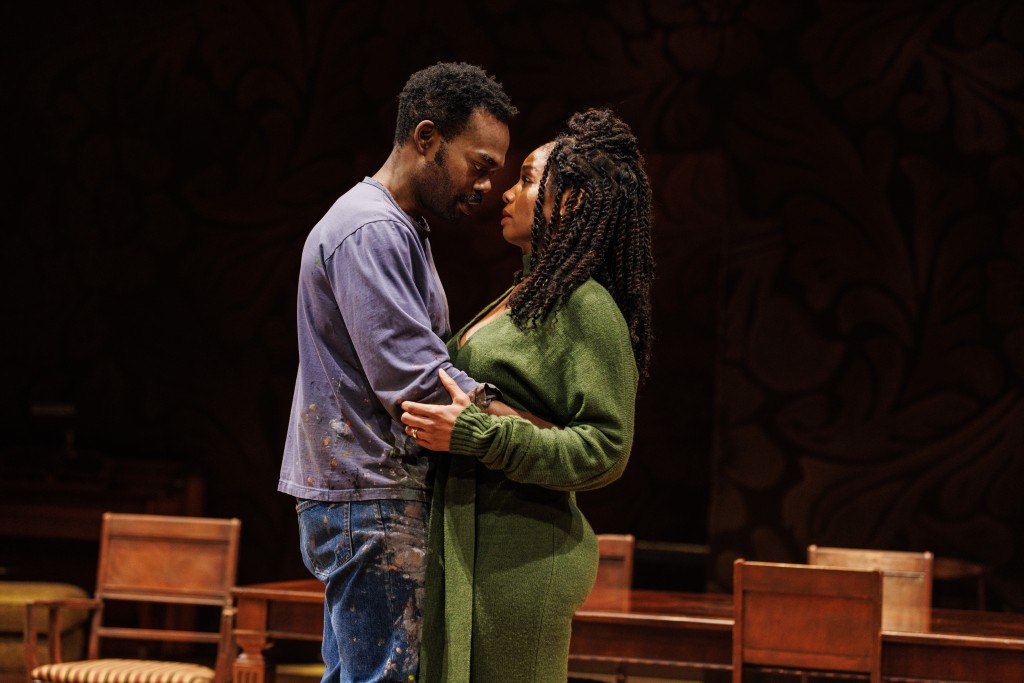
The situation is fraught with problems, hatreds, regrets, upsets and soul turmoil, which Schreck has stirred following Chekhov’s dynamic. Thus, Carell’s Vanya and Harper’s Astrov are humorous in their self-loathing as is the arrogant Alexander and vapid Elena who Sonia suggests can end her boredom by helping them on the farm. Of course, work is not something Elena does, which answers why she has married Alexander and both have been the parasites who have sucked the lifeblood of Vanya and Sonia, as they labor for their “betters,” who are actually inferior, ignoble and selfish.
To complicate the situation, Sonia is desperately in love with Astrov, who can only see Elena who is attracted to him. However, Elena is afraid to carry out the possibility of their affair. Instead, she destroys any notion that Sonia has of being with Astrov by ferreting out Astrov’s feelings for Sonia which tumble out as feelings for Elena and a forbidden, hypocritical kiss which Vanya sees and adds to his rage at Elena’s self-righteousness and martyred morality. When Elena tells Sonia that Astrov doesn’t love her, Sonia is heartbroken. It is Pill’s shining moment and everyone who has experienced unrequited love empathizes with her devastation.
When Alexander expresses his plans to sell the estate and take the proceeds to live in the city in a greater comfort and elegance, Carell’s Vanya excoriates Alexander and speaks truth to power. He finally clarifies his disgust for the craven and selfish Alexander, despite Maria’s belief that Alexander is a great man, not the fraud Vanya says he is.
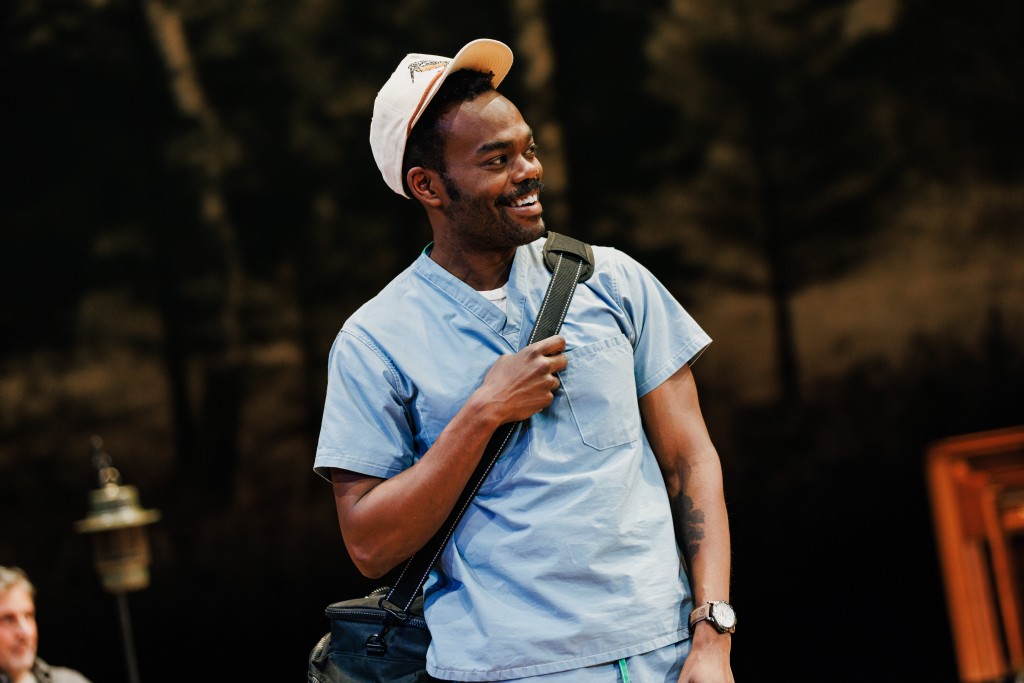
It is a gonzo moment and Carell draws our empathy for Vanya who attempts to expiate his rage, not through understanding how he is responsible for being a dishrag to Alexander, but through manslaughter. The scene is brilliantly staged by Neugebauer and is both humorous and tragic. The denouement happens quickly afterward, as each of the characters turns to their own isolated troubles with no clear resolution of peace or reconciliation with each other.
The ensemble are terrific and the actors are able to tease out the authenticity of their characters so that each is distinct, identifiable and memorable. Naturally, Carell’s Vanya is sympathetic as is Pill’s heartsick Sonia, for they nobly uphold the ethic that work is a kind of redemption in itself, if dreams can never come true. We appreciate Harper’s Astrov in his love of growing forests and his understanding of the extent to which the forests that he plants will bring sustenance to the planet, if even to mitigate only somewhat the society’s encroaching destructiveness. Even Katigbak’s Marina and Sonia’s godfather Waffles (the excellent Jonathan Hadary), are admirable in their ironic stoicism and ability to attempt to lighten the load of the others and not complain.
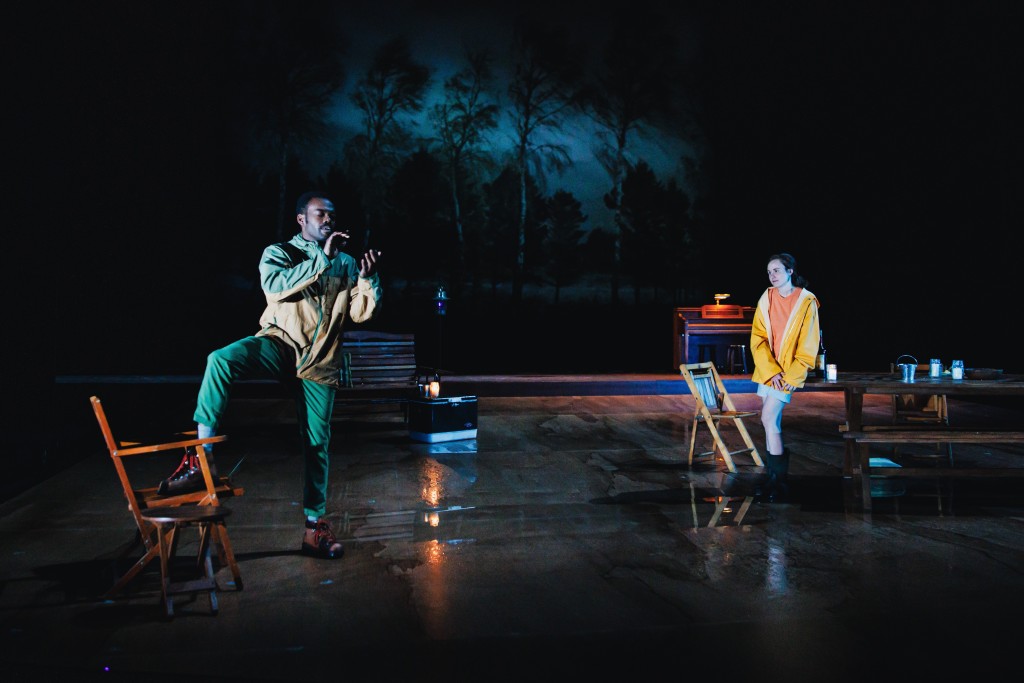
Finally, as the foils Molina’s Alexander and Noni Rose’s Elena are unredeemable. It is fitting that they leave and perhaps will never return again. The chaos, misery, dislocation and confusion they leave in their wake (including the somewhat adoring fog of Houdyshell’s Maria), are swallowed up by the beautiful countryside and the passion to keep the estate functioning which Sonia and Vanya hope to achieve in peace. Vanya, for now, has thwarted Alexander, by terrorizing Alexander into obeying him in a language (threatening his life), he understands. For this we applaud Vanya.
When Alexander and Elena leave, the disruption has ended and they take their drama and chaos with them. It is as if they were never there. As Vanya and Sonia handle the estate’s paperwork, which they’ve neglected having to answer Alexander’s every need, the verities of truth, honor, nobility and sacrifice are uplifted while they work in silence, and peace is restored to the estate, though they must suffer in not achieving the desires of their lives.
Neugebauer and Schreck have collaborated to create a fine version of Chekhov’s Uncle Vanya that will remain in our hearts because of the simplicity and clarity with which this update has been rendered. Thanks go to the creative team. Mimi Lien’s set design functions expansively to suggest the various rooms of the estate, the garden and hovering forest in the background. A decorative sliding divider which separates the house from the forest and allows us to look out onto the forest and woods beyond (a projection), symbolizes the division between the natural and the artificial worlds which influence and symbolize the characters and what they value.
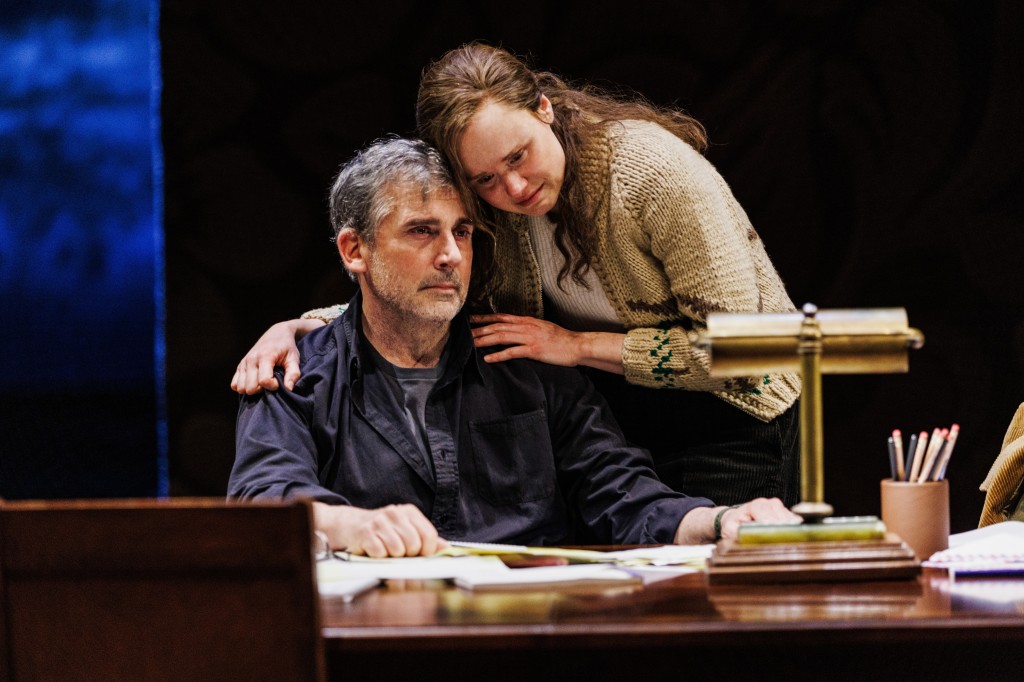
Vanya and the immediate family take their comforts from the earth and nature as does Astrov. Alexander and Elena have forgotten it, finding no solace in the beautiful surroundings and quiet, rural lifestyle which they find boring because they prefer chaos and the frenetic atmosphere of society. Essentially they are soul damaged and need the distractions they’ve become used to when Alexander was famous and the life of the party before he got tiresome and old and disgusting in the eyes of Elena and those who fired him..
The projection of trees that expands entirely across the stage in the first act is a superb representation of what is immutable and must be preserved as Astrov works to preserve. The forest of trees which is the backdrop of the garden, sometimes sway in the wind. The rustling leaves foreshadow the thunder storm which throws rain into the garden/onstage. The storm symbolizes the storm brewing in Uncle Vanya about Alexander, and emotionally manifests when Alexander suggests they sell the estate to fulfill his personal agenda.
During the intermission every puddle and water droplet is sopped up by the tech crew. Kudos to Lap Chi Chu & Elizabeth Harper for their lighting design and Mikhail Fiksel & Beth Lake for their sound design which bring the symbolism and reality of the storm home.
The modern costumes by Kaye Voyce are character defining. Elena’s extremely tight knit, brightly colored, clingy dresses are eye candy for her admirers as she intends them to be to attract their attention, then pretend she doesn’t want it. Of course she is the leisurely swan while Sonia is the ugly duckling in work clothing, Grandmother Maria dresses like the “hippie radical feminist” that she is, and Marina is in a schmatta as the servant who cooks and cleans. Here, it is easy for Elena to shine; there is no competition.
Vanya looks frumpy and uncaring of himself. This reflects his depression and lack of confidence, while Molina’s Alexander is dressed in the heat like a peacock with a scarf, cane and hat and cream-colored suit when we first see him. Astrov is in his doctor’s uniform, utilitarian, purposeful, then changes to more relaxed clothing. The costumes are one more example of the perfection of Neugebauer’s vision and direction of her team.
Uncle Vanya is an incredible play and this update does Chekhov justice. It is a must-see for Schreck’s script clarity, the actors seamless interactions and the creative teamwork which elevates Chekhov’s view of humanity with hope, sorrow and love in his characterizations, especially of Vanya.
Uncle Vanya runs two hours twenty-five minutes including one intermission, Lincoln Center Theater at the Vivian Beaumont. https://www.lct.org/shows/uncle-vanya/whos-who/
‘Mother Play,’ Stellar Performances by Celia Keenan-Bolger, Jessica Lange, Jim Parsons
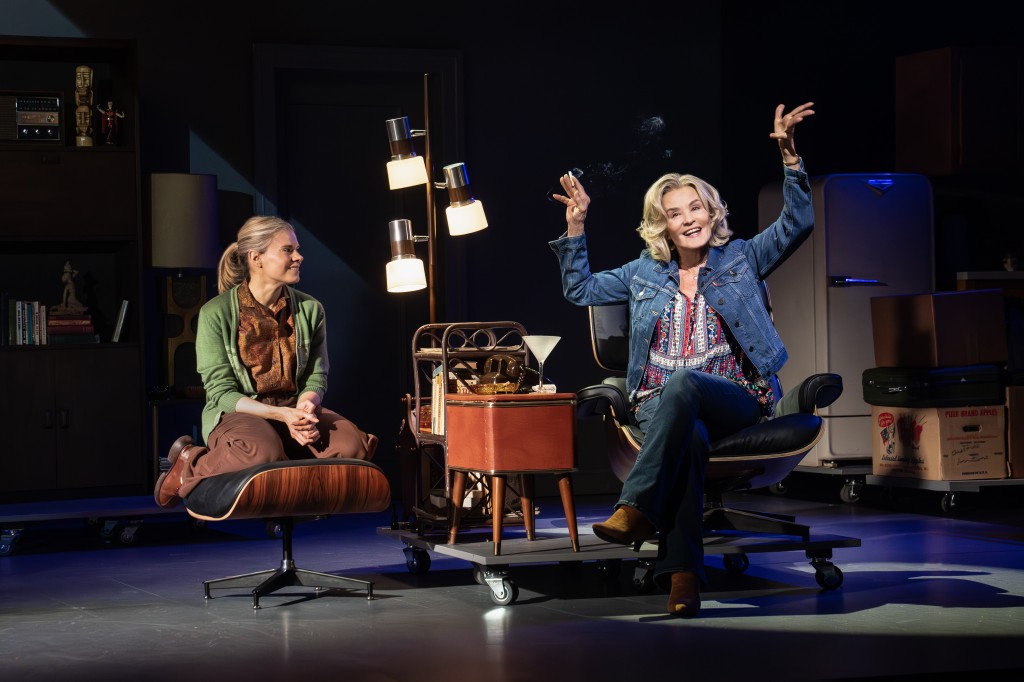
One of the keys to understanding Mother Play, A Play in Five Evictions by Paula Vogel is in the narration. Currently running in its premiere at 2NDSTAGE, directed by Tina Landau, Vogel’s play is has some elements of her own life, by is not naturalistic. It is stylized, quirky, humorous, imaginative and figurative, like most of her plays. In a nod to Tennessee Williams’ The Glass Menagerie, in the notes, she suggests it is a memory play.
Presumably, the play focuses on a representative mother, Phyllis, portrayed with impeccable sensitivity, raw emotion and nuanced undercurrents of bitterness, humor and irony by the exceptional Jessica Lange. However, the play is actually about a mother-daughter relationship that moves toward reconciliation. As such, the narrator/daughter (the always superb Celia Kennan-Bolger), directs us to her understanding of the last forty years of her life in her relationship with her mother, via the unreliable narrator’s viewpoint.
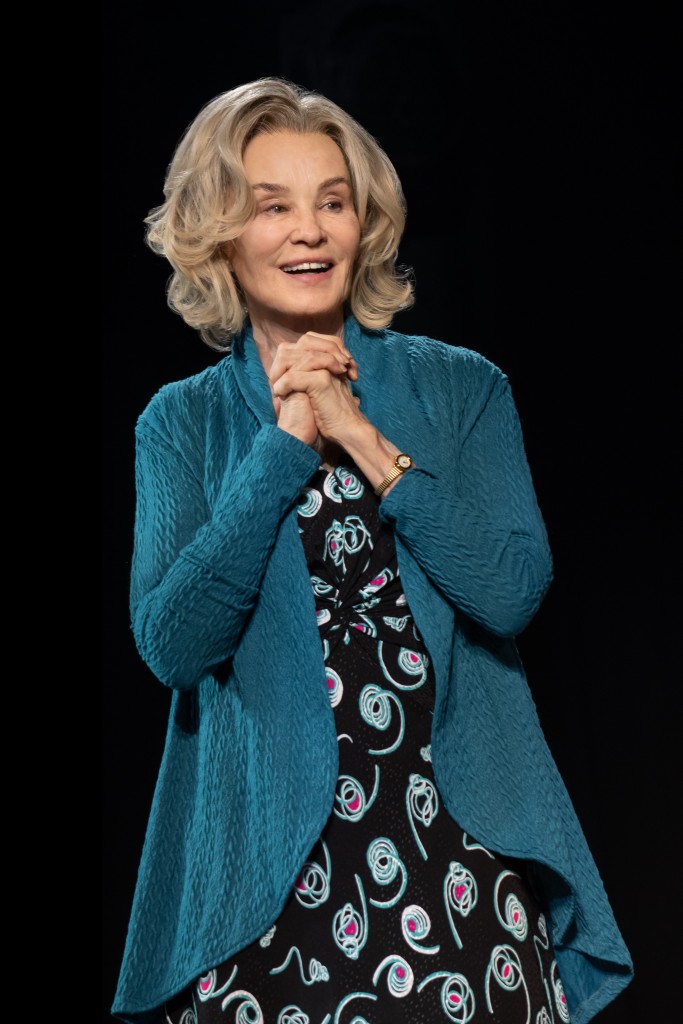
Should we believe everything the narrator says happened? Or does Martha’s perception of her mother cling to highlights of the events most hurtful and damaging to her? We must ultimately decide or remain uncertain until the play’s conclusion. It’s a delicious conundrum that emphasizes Vogel’s themes of the necessity of developing a deeper understanding of relationships, emotional pain, working through hurt and so much more.
Martha’s genius gains our confidence, empathy and identification with her confessional re-enactment flashbacks as she remembers events, through the highs and lows of five evictions her family experiences together, after their father dumped them for greener pastures. A key figure in the family dynamic is her two-years older brother Carl, Martha’s brilliant, sweet and kind protector, portrayed with clarity, humor and depth by Jim Parsons.
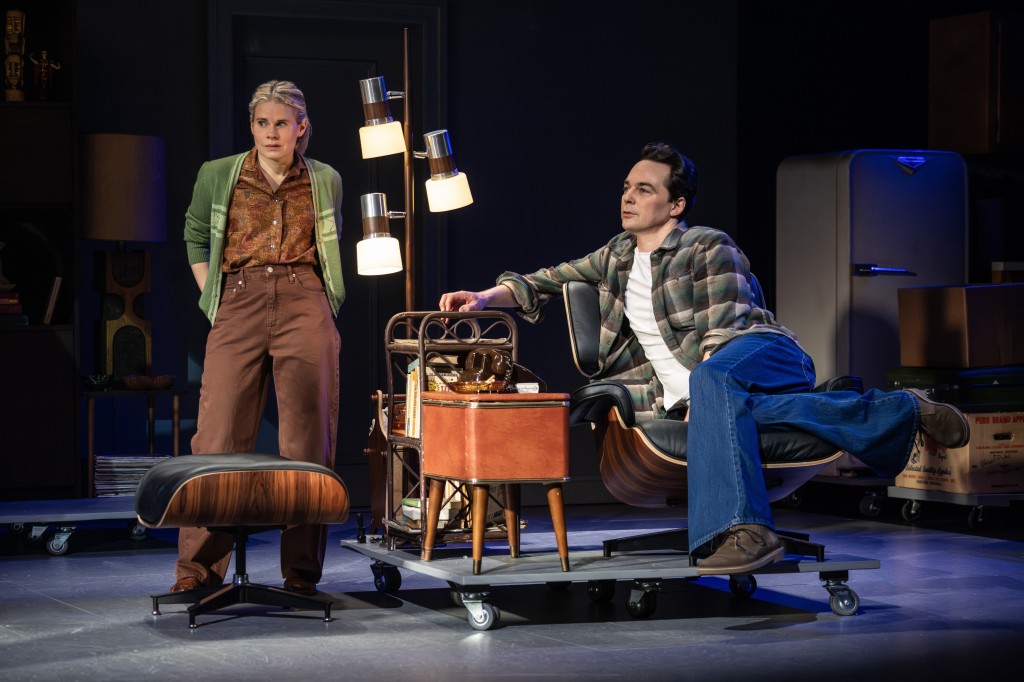
At the top of the play, which is in the present, Martha is in her early 50s. She tells us that by the time she was 11, their family had moved seven times because their father had a “habit of not paying rent.” Thus, they learned to pack and unpack in a day. She comments with irony that there is a season for packing and a season for unpacking, referencing the Biblical verse (Ecclesiastes 3:1-8), and the Byrd’s song, “Turn, Turn, Turn.”
To destabilize and uproot children from their friends and school mates so many times is a calculation Vogel’s Martha never makes. But it speaks volumes about how the brother and sister rely on each other emotionally, because they are social isolates by necessity of the continued movement which their father, whom we only hear about, didn’t even take into consideration.
As Martha opens a box of the only things her deceased brother had left in their apartment, she takes out a bunny rabbit and a letter Carl had written to her. With the letter, Parson’s Carl materializes and Martha joins him as they step into a series of flashbacks which chronicle events that lead to the five times they were evicted by landlords or they evicted themselves from each other’s lives, only to return, eventually.
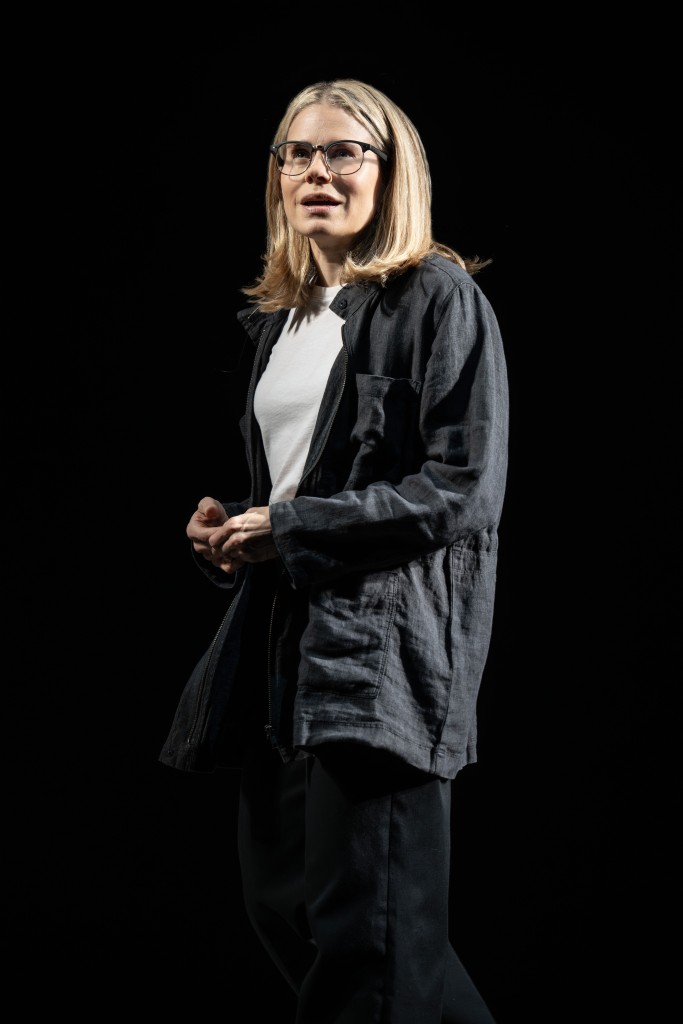
Cleverly grounding this family’s living arrangements to present her salient themes about “forever pain,” the impossibility of “mothering,” sacrifice, regret and love, Vogel uses two devices. The first is their furniture which they take with them and rearrange each time they pick up and take off for various reasons. Secondly, there are the roaches, which are magical and symbolic, not only of the poverty and want their father stuck them with, but of the emotional terror and fear of living precariously on the edge of society, sanity and Phyllis’ desire for normalcy.
The roaches, at key moments manifest, swarm, go creepy crawly and loom monstrously in their lives. Since Phyllis signs leases to cheaper basement apartments, promising they will take out the garbage, they are forced to live with these vermin, an indignity of representative squalor from which they never seem to be freed, despite upwardly mobile Phyllis’ attempts to rise to apartments on higher floors.
The first flashback occurs when Martha is twelve, Carl is fourteen, and Phyllis is thirty-seven, in their first apartment away from their father after the divorce. Carl and Martha arrange the furniture and when they are finished, they swivel around Phyllis, reclining in an easy chair in Landau’s deft, humorous introduction of the women the play is allegedly about. Far from “taking it easy” Lange’s Phyllis demonstrates she is “on edge” and seeks to quell her nerves at this first move without her husband. She immediately importunes her children for the following: her cigarette lighter (a gift from “the only one she loved”), a glass for the gin which she carries in a bottle in her large handbag, ice, ready made in a tray in a box. After pouring herself a drink and puffing on her cigarette, she begins to relax and says, “Maybe mother will be able to get through this.”
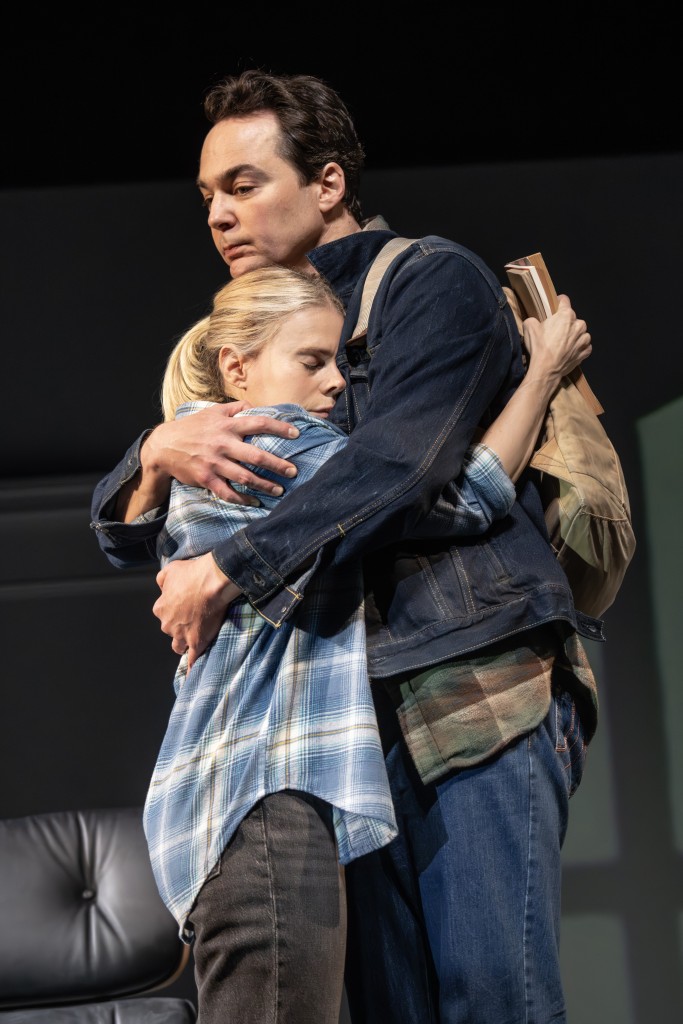
Ironically, the “this” has profound, layered meaning not only for the moment, but for what is ahead for Phyllis, including single parenting, a possible nervous breakdown, poverty, responsibility as a mother, her job and more.
Phyllis pulls out their dinner in a McDonald’s bag from her bottomless black purse, which is empty of money because their father wiped out all the accounts. She speaks of their future-Martha cooking, cleaning and getting dinner, and Carl continuing his excellence of a near perfect score on the PSATs in verbal skills. Phyllis predicts Carl will be the first one in the family to get into college via a scholarship. Martha will take typing and get a job like her mother so that if a man leaves her like her father discarded her mother, she will be able to support herself.
Though Carl quips flamboyantly, about affording rent at the Algonquin, Martha sours at having to share a bedroom with her mother who snores. The favored one, Carl gets his own room. With their new beginning as latch key kids, who have to make their own lunches and deal with their own problems, toward the end of the segment, Carl humorously asks Martha if their childhood has ended.

Being a breadwinner and sole parent is a circumstance Phyllis bitterly resents. Culturally, moms still stayed at home, cooked, cleaned, did the laundry, took care of all the needs of the children, attended to them before and after school, and bowed to their husbands, who had the freedom to do what they pleased, expecting dinner at whatever hour they returned to a wife thrilled to see them. It is this “achievement” that Phyllis wishes for Martha, whom she hopes will marry someone unlike Mr. Herman, in other words a bland man who is unappealing to women and just wants a loyal wife like Martha will be because Phyllis has raised her to be the good woman.
Though Phyllis proudly proclaims this new apartment is a step in the right direction, Phyllis cannot “move on” to annihilate memories of her husband’s past physical and financial abuse, his scurrilous behavior, his machismo insisting all is his way. Filled with regret, Phyllis lapses into negative ruminations about their father who doesn’t provide child support or come to visit. Her cryptic remarks, sarcasm and “treatment” of Martha and Carl, who she openly praises and admires, while being “hard” on Martha, so she won’t marry a fraud, is sometimes humorous, but mostly unjust. In the telling Martha has our sympathy against this cruel, anti-nurturing mother.
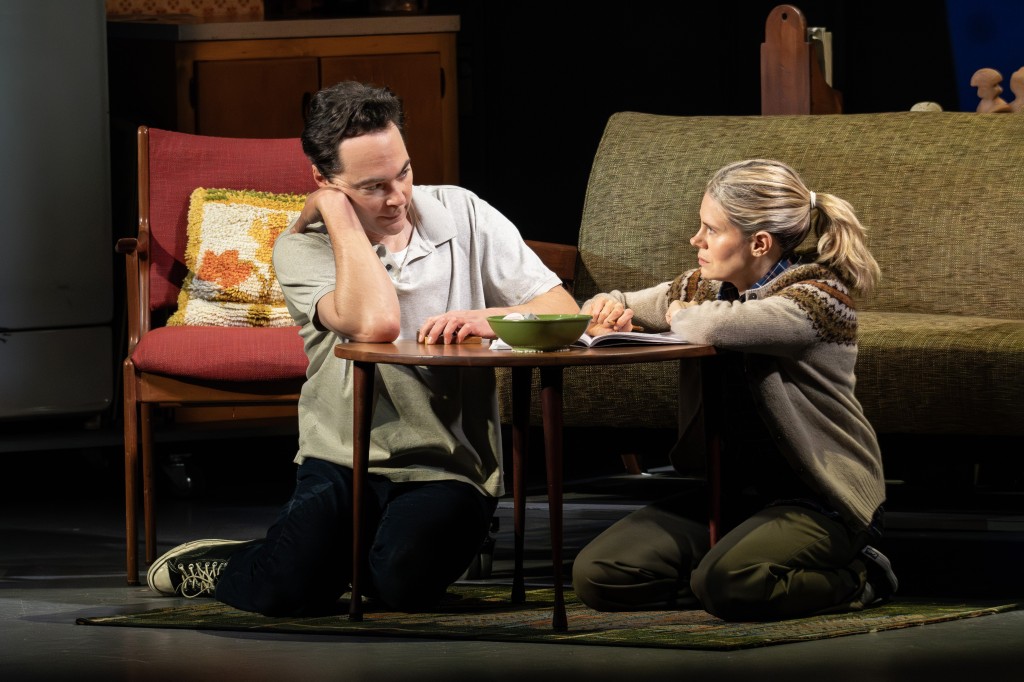
Ultimately, we learn that each time they move for a reason that triggers them, each time they pack and unpack and arrange the furniture to settle in, they are still stuck in the same place emotionally because Phyllis can’t forget, forgive or release her anger. And though she adjusts as best she can, she relies emotionally on Carl and Martha, who she eventually evicts when she discovers they live a lifestyle that disgusts her and shatters her dreams for them.
Sprinkled throughout the five evictions and events leading up to them is Vogel’s humor and irony which saves the play from falling into droll repetitiveness because emotionally Phyllis’ needle is stuck in the same groove. Her emotionalism worsens as key revelations spill out about who she is as a woman, who once was adored by the same man who left her for “whores.” Throughout the sometimes humorous, sometimes tragic and upsetting events, Carl and Martha continue to serve and wait on Phyllis until they reach their tipping point. Overcoming these painful events with their mother because they have each other, Carl continues to guide and counsel Martha as a loving brother. This becomes all the more poignant when he leaves the family for various reasons, the last one being the most devastating for Martha and Phyllis.
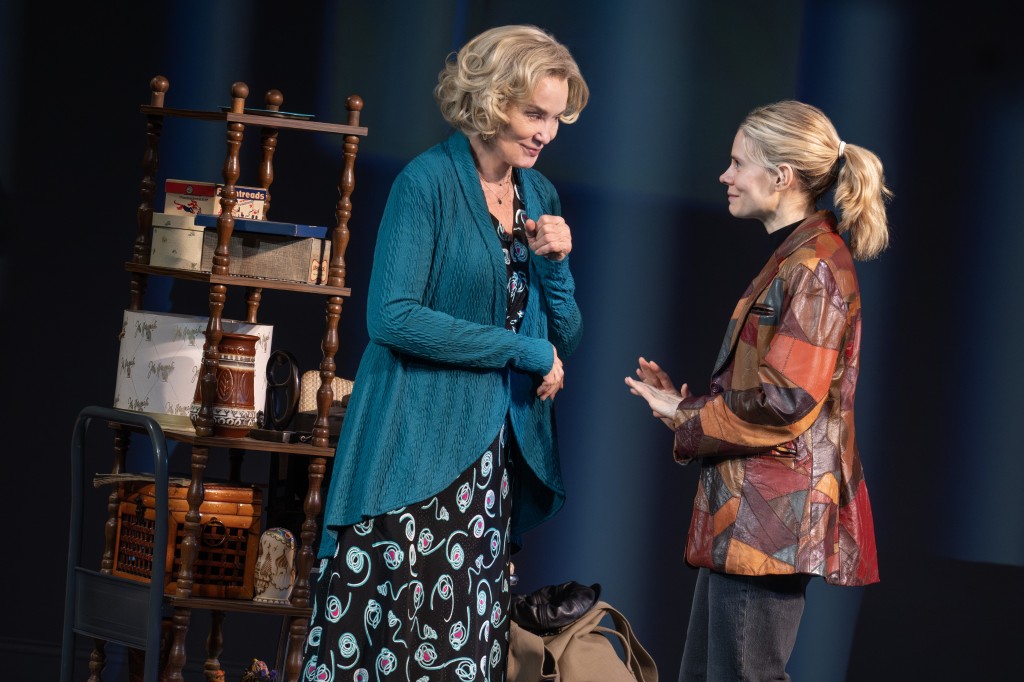
Landau’s direction and vision for this family whose dysfunction is driven by internal soul damage shared and spread around is acutely realized. The following creatives enhance her vision: David Zinn’s scenic design of movable furniture, Shawn Duan’s projection design of interminable roach swarms, Jen Schriever’s ethereal, atmospheric lighting design (when Carl appears and disappears in Martha’s imagination), and Jill Bc Du Boff’s sound design (I heard every word).
Landau’s staging and shepherding of the actors yields tremendous performances. Lange’s is a tour de force, encouraged by Parsons and Keenan-Bloger, whose development through the years pinging the ages from Martha’s 12 years-old and Carl’s 14-years old through to Martha’s fifties is stunning. Parson moderates his maturity and calmness as a contrast to the dire events that occur in the play’s last scenes. The disco scene is amazingly hopeful until Phyllis breaks emotionally and spews fearful, hurtful words.
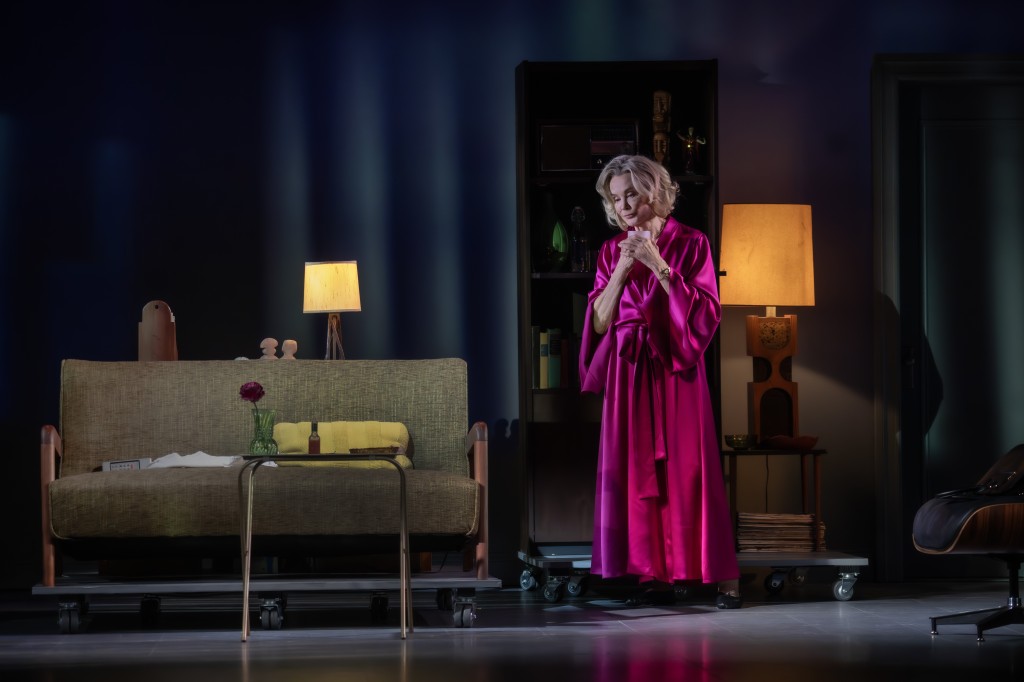
Always, Keenan-Bolger’s Martha remains ironic, rational, questioning, matter-of-fact. Lange’s fragility and vulnerability underlying her outbursts prompt the stoic response from Parsons and Keenan-Bolger, whose Carl and Martha often take the role of the adults in the room. After a while, Martha has so blinded us to her portrait of Phyllis, we believe her hook, line and sinker that Phyllis is a b*&ch.
Phyllis’ deterioration into heartbreaking loneliness as her children remain estranged from her is attempted by Vogel in a scene that may have been shortened or should have been realized differently, or should have included different tasks by Lange’s Phyllis. Phyllis attempts to moderate her drinking alone in the evening at a time when women get drunk as evening alcoholics. She prepares her drink when she arrives at her set time (looking at her watch), as if using alcohol like a prescription medicine. The playing of cards, getting dinner, trying to make it tastier, spitting it out and trashing it, then having her timed drink, then eventually looking into a crystal ball could have been shortened.
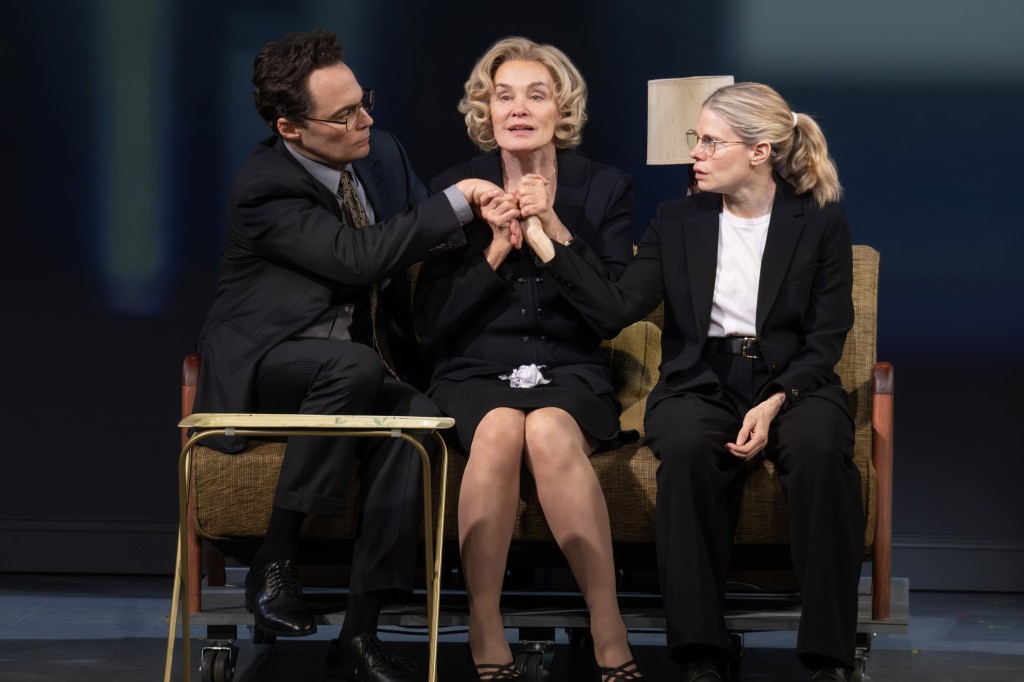
But this is Martha’s imagined view of what her mother does alone. It doesn’t work as fluidly as the other scenes do. Perhaps this is because none of Martha’s interior dialogue is externalized? We only see her outer actions in silence. Martha doesn’t imagine Phyllis’ interior dialogue because that might require an empathy for her mother, she doesn’t have at this point in the play. It is an interesting disjointed scene, perhaps for a very good reason that exposes Martha’s shortcomings about her mother, particularly in understanding and empathizing with her.
However, Keenan-Bolger and Lange bring the play home with the poignant, affirming ending. For the first time, Martha, who speaks to an ethereal Carl sitting in a chair reading in a dimly lit section of the stage, gives herself a break from internalizing her family members’ anger. She allows herself to see what was perhaps there all along in her mother’s opinion of her. But first she must cast all the anger from the past aside. What penetrates is Martha’s new realization of a Phyllis she never understood before. It is a long awaited for moment of feeling that opens a flood of love between them. Vogel leaves it open for audience interpretation as it should be. Either way, the misshapen puzzle pieces fit into redemption and forgiveness.
Mother Play, a Play in Five Evictions is a must-see. It runs with no intermission for one hour and forty-five minutes. The Hayes Theater is on 210 West 44th Street between Broadway and 8th Avenue. https://2st.com/shows/mother-play
‘Hell’s Kitchen’ Blasts Onto Broadway and Electrifies With New York’s Resounding Energy
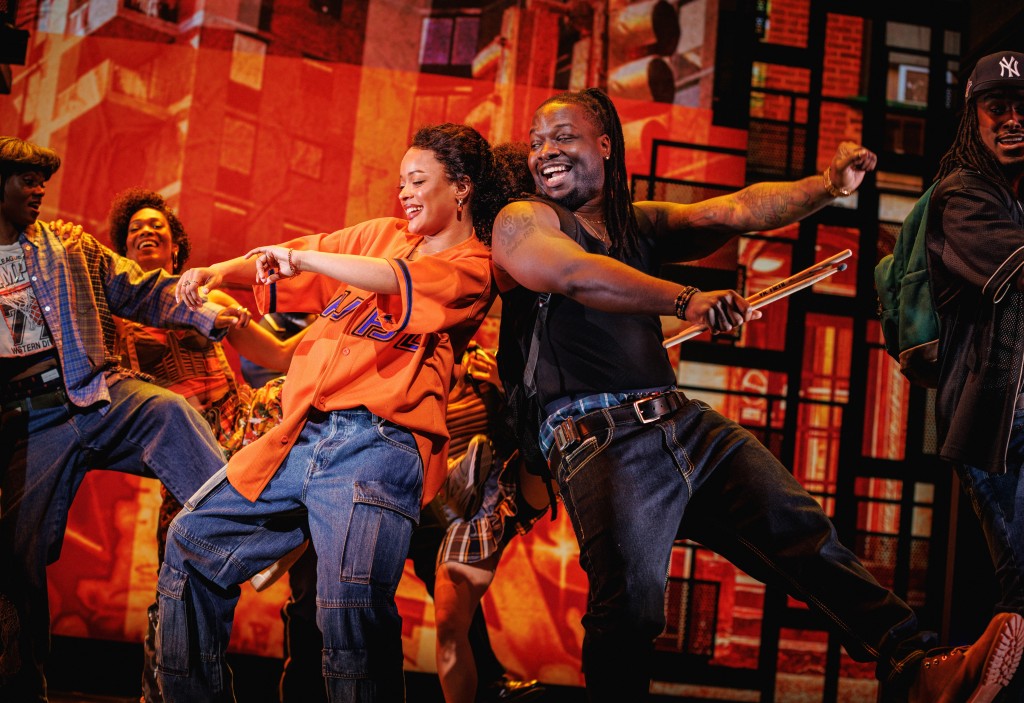
Hell’s Kitchen, premiering on Broadway in its transfer from the Public Theater is nothing short of gorgeous perfection. Though the creative team rendered a phenomenal production in the fall of 2023 at the Public’s Newman Theater, the 299 seat venue and smaller stage offered a constricted space. The Shubert Theatre Broadway is the proper venue for this update, expanding the bravura performances and allowing for the outsized dance numbers and abundance of talent that is free to explode with musical glory. This production is totally “on fire” and more than “ready” for Broadway in a masterful presentation of Alicia Keys’ music in a coming-of-age story that is inspired by her own life!
With its apparently seamless transfer, Hell’s Kitchen, with book by Kristoffer Diaz, Alicia Keys’ glorious lyrics and music, Adam Blackstone’s music supervision, Camille A. Brown’s dynamic choreography, Michael Greif’s thoughtful direction and Alicia Keys and Adam Blackstone’s arrangements of key songs from her repertoire (and a few new ones), what’s not to adore?
Integrating Keys’ playlist with an organic story rooted to a New York setting during a period of a few months, Greif, Keys and Diaz’s choices stir up the magic that makes this production uncharacteristic and unique, far from the typical obtuse branding of a “jukebox” musical, which it isn’t. The overriding conflict in Hell’s Kitchen is between mother and daughter in their story of reconciliation, which on another level writes a love letter to New York’s loudness, brashness, street people, and atmospheric social artistry in the 1990s.
Even if you are not an Alicia Keys’ fan, you will be enthralled with the performance of the sterling, exceptional voice and presence of Maleah Joi Moon, who is the frustrated Ali, who casts herself as the princess her mother (Shoshana Bean), cages in their apartment. Ali fights for her “freedom” against her narrow vision of her “monster” mom who she believes is a restrictive, paranoid, hypocrite who doesn’t know what life is about. Meanwhile, underneath, she is crying inside, but doesn’t realize how and why.
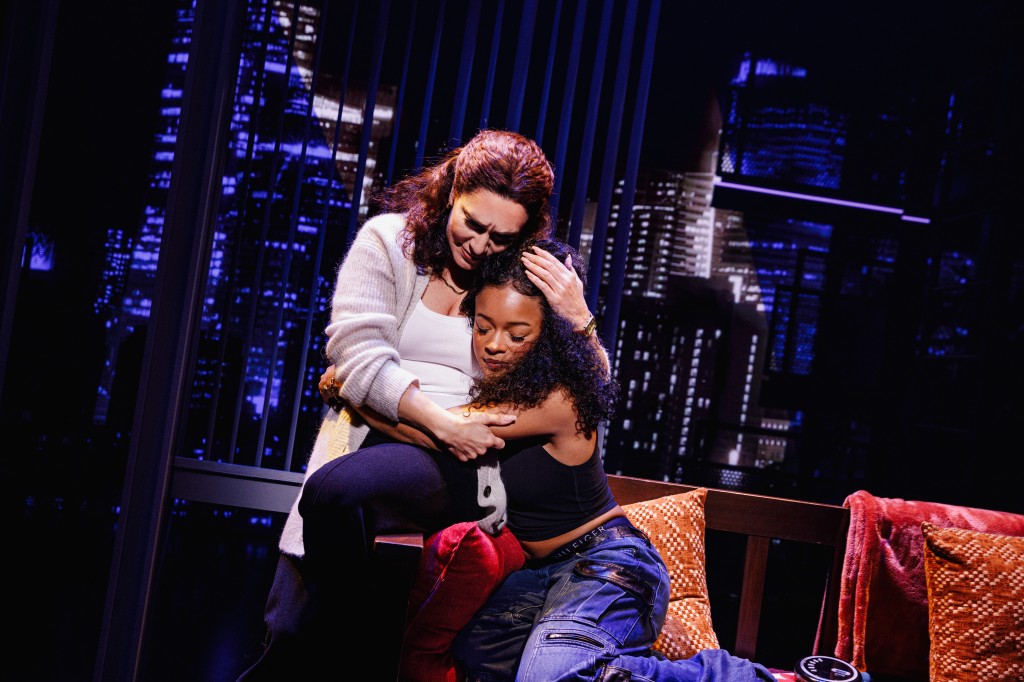
Using flashbacks from the present with events highlighting all the characters that mattered in her life at the time, Ali tells her story of a special summer, not as we are initially led to believe, because she is with a man. Rather it is a reflection on her past from which she gains wisdom and understanding, through love, sorrow, heartbreak and renewal. The backstory of Ali’s life at Manhattan Plaza, a subsidized residency for artists, is revealed in various songs: “The Gospel,” “The River,” “Seventeen,” and others. Through her storytelling, she reveals her understanding of how pivotal these events are in her relationship with her mother and father, and her relationship with herself as an artist.
Ironically, Jersey (the non pareil Shoshana Bean), knows all too well how one is caught up in the distractions of the opposite sex (“Seventeen”). She coupled with Davis (the soulful Brandon Victor Dixon), when both were not ready to be Ali’s parents. While Davis took off to pursue his career, Jersey gave up hers to raise Ali, work two jobs, live in subsidized housing for artists at Manhattan Plaza, and attempt to corral Davis whenever he was in town to be a father to Ali. Though Ali knows the facts about her parents, she doesn’t understand the profound nature of their relationship as it relates to her. She resents Jersey and Davis and tries to suppress underlying anger about feeling unloved, unwanted and tyrannized. The rage spills out continually against Jersey who must take the brunt of it as a single parent.
Ali seeks her identity and purpose apart from the family situation and her father’s “abandonment” that she rages against. Spurred on by her friends she throws herself herself at Knuck (Chris Lee). The twenty something is one of a three-person bucket drumming crew providing excitement and sexy currents busking in the courtyard of Ali’s residence. Ali’s attraction to him is so palpable, Jersey warns the doorman and her police friends to “watch out” for her daughter’s wiles with the “bucket drummer,” which miffs Ali. When tensions increase with her mother, Ali seeks comfort from Miss Liza Jane’s (the incredible Kecia Lewis), classical piano playing in the Ellington Room of Manhattan Plaza, which so inspires her, she realizes she’s found a part of herself, (“Kaleidoscope”).
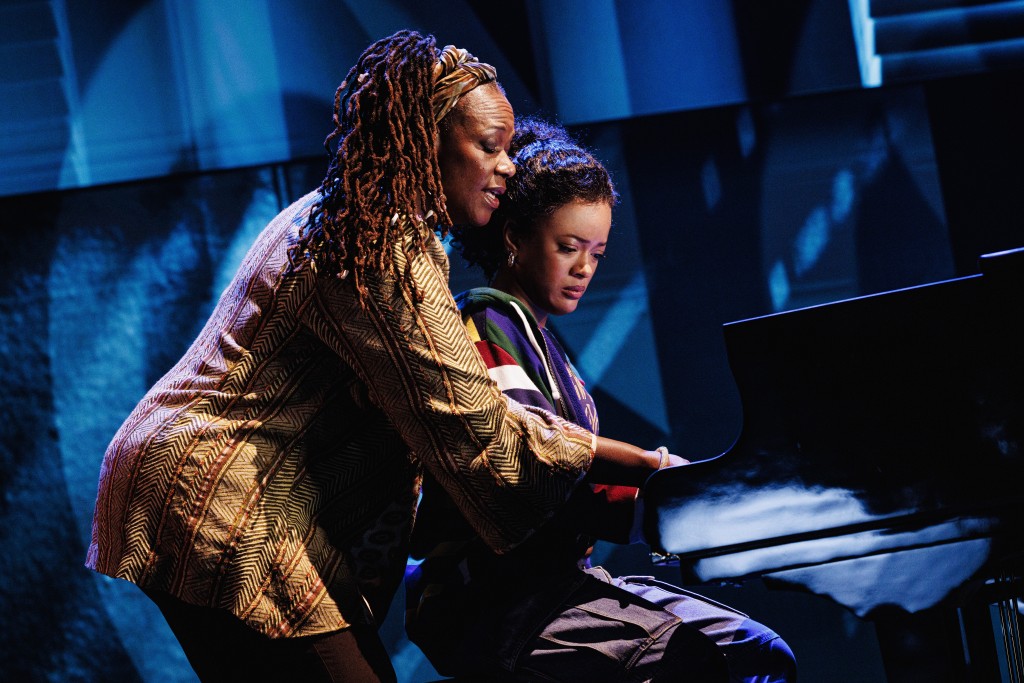
There is an underlying irony that Diaz’s book suggests about Ali’s selection of Knuck. Of all the guys at her disposal in New York City, the ultimate attraction falls under her mother and her gossipy doorman’s and neighbors’ noses. Of course her mother is provoked and has a friend cop disperse the drummers. The drummers think they are unwanted because Ali’s mom is white and a racist. Though they are not arrested, the event is frightening. Importantly, it reveals Ali is selfish and willful. Her underlying problems with her family will leech out to impact her relationships unless she checks herself and tries to resolve them, but at this juncture, she doesn’t. Instead, she searches out Knuck who tries to tell her his experiences as a Black man fighting an identity he is branded with, in an attempt to get her to understand that the situation with her white mom’s reaction is dangerous (“Gramercy Park”).
In an attempt to reach out to her daughter, Jersey discusses why she is so “paranoid,” and we get to meet the sexy Davis (“Not Even the King”) when Brandon Victor Dixon smoothly croons his heart out. Bean’s Jersey joins him in “Teenage Love Affair,” and we understand how both allowed the sizzling attraction between them to overthrow rationality, precisely what Jersey fears will happen to Ali. After her discussion with Ali, it seems that mother and daughter have reached an agreement and understanding. However, Ali pushes that understanding aside and willfully seeks out Knuck.
With almost unconscious rebellion, without regard for Knuck (she lies about her age), she pursues an intimate relationship with him (“Un-thinkable [I ‘m Ready]). Indeed, with her provocative behavior, encouraged by her friends in the astounding “Girl on Fire,” she boldly brings Knuck to her apartment, flaunting her faux adulthood on Jersey and disrespecting their home. is it any surprise Jersey finds them in a state of undress? The white mother who has branded Knuck throws him out; and that is when he is told Ali is underage. He runs for his life.
When Ali runs after him, there is confusion and chaos downstairs where his friends have been drumming. Ali tries to apologize to Knuck in front of the crowd when Jersey stops her, tells her to go upstairs and slaps her when she ignores her. Jersey’s action serves as a trigger, the doorman catches Knuck, and cops arrive with flashing red lights to arrest the drummers.
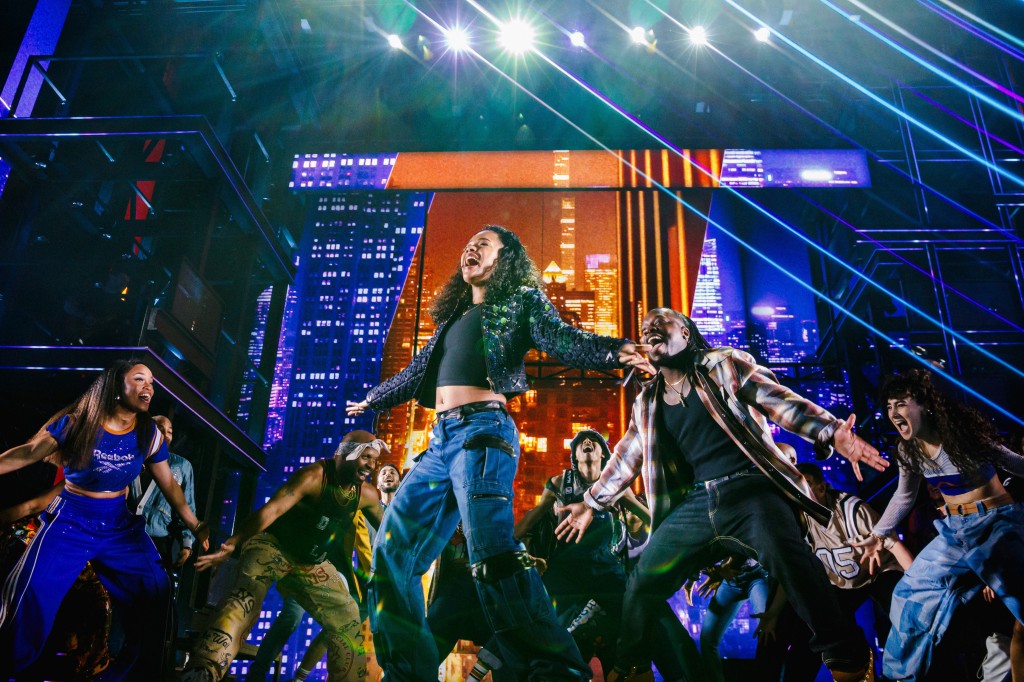
In a typical aftermath, we don’t know if the drummers who have done nothing are OK or not. A hysterical Ali is helped by Miss Liza Jane who finally gets through to Ali (“Perfect Way to Die”), helped by the Peter Nigrini’s projection design which include black and white photos of sons and daughters who have been the victims of police brutality, otherwise known in the South as lynchings. In the interlude Miss Liza Jane tries to encourage Ali, inform her about the racial history of the US and quietly suggest that she can’t afford to be reckless in a racist culture. Miss Liza Jane affirms that Ali must take her anger and pain and use it for an artistic purpose. This is another major theme of Hell’s Kitchen, a theme which Alicia Keys and her friends in the music industry realize every day of their lives.
Interestingly, Hell’s Kitchen doesn’t beat the audience over the head with police brutality; no one is injured, but Miss Liza Jane, who shares her historical, personal experiences sings/speaks to Ali like an adult who can understand. Wisely, Keys and Diaz reveal sub rosa the institutional racism in the culture as it is suggested in “You Don’t Know My Name.” In that song, they emphasize the harm in stereotyping, branding and dismissing the humanity of Knuck as “invisible.” Indeed, Jersey falls into the trap out of fear, though she is not a racist and has a mixed race daughter. Nevertheless, this profound concept is revealed; and as open minded as Jersey is, she is unfair to Knuck. Her daughter is to blame for lying to him.. In how many situations like this have Black men been killed? Knuck and his friends, thus far, have been fortunate.

Moon’s Ali is a combination of innocent and alluring, a convincing “wild child” who wants to attract Knuck, the forbidden prize she can toy with, (repeating the same situation her mother was in), to provoke Jersey for love, or perhaps to drive at a deeper understanding between them. Her obtuseness in endangering Knuck and the others, until the amazing Kecia Lewis’ Miss Liza Jane, and Brandon Victor Dixon’s superb Davis counsel her, is key to her evolution. Importantly, it is a vital mentoring theme for teenagers.
In Act II, when Ali suffers a touching loss that she can’t overcome, but can only move forward through, Moon is just terrific in expressing her hurt and sorrow with grace. Her performance is a smashing powerhouse. Likewise Shoshana Bean as Jersey, in her presence, her fear, anger, panic and emotionalism, rocks the role out of the ballpark.
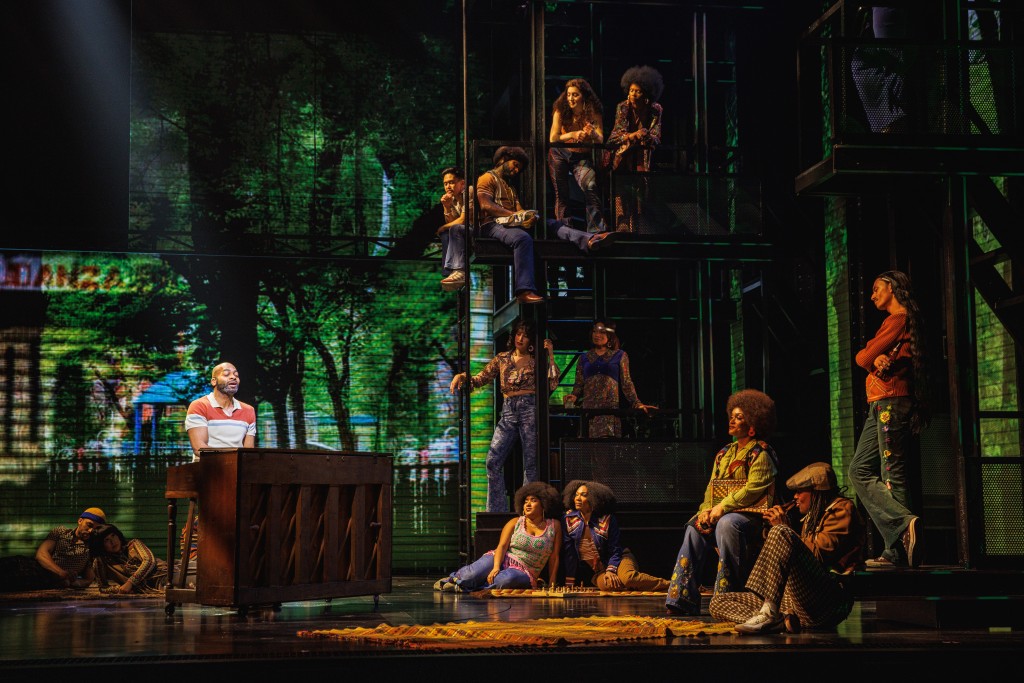
The two actors create a felt relationship that is authentic and heartfelt. They effect a mother daughter bond that satisfies all the digressions from rebellion, to incriminations to regrets, to sorrows, to reconciliation and a forever, spiritual love which Act II’s songs encompass, especially “If I ain’t Got You,” Hallelujah/Like Water,” “No One.” And of course Hell’s Kitchen wouldn’t be “Hell’s Kitchen” without “Empire State of Mind” in which all the creative team, the swings, Chloe Davis (dance captain), and others pull out the stops and dance and sing passionately as Peter Nigrini’s marvelous projections of New York City’s aerial views at night, form the moving backdrop.
Kecia Lewis as Miss Liza Jane, Chris Lee’s Knuck and the smooth, silky voiced Brandon Victor Dixon are the counterparts of Maleah Joi Moon and Shoshana Bean. The bucket drummers, and Ali’s girls have exceptional voices and presence. There is no spoiler; I’ve intentionally left out a discussion of how the resolution and renewal occurs and when it occurs in Act II.
You really shouldn’t miss Hell’s Kitchen, especially if you are a New Yorker.
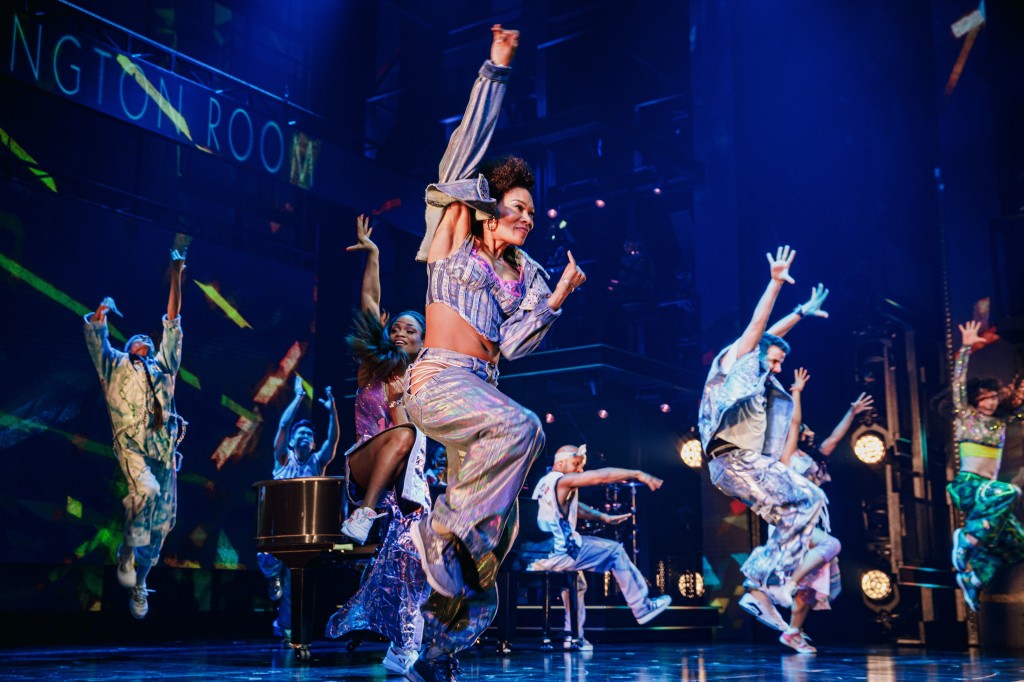
Finally, Michael Greif’s vision, his integration of Robert Brill’s fabulous scaffolding scenic design with the rectangular construction grids stylizing the New York City buildings with neon lights, is perfect. Situating the musicians above on the scaffolding so the music rings out the harmonies of Adam Blackstone’s and Alicia Key’s arrangements, in fact all of it, including Natasha Katx’ multi-colored lighting and spots are breathtaking. Importantly, Gareth Owen’s sound design is balanced and painstakingly effected, so I heard each word. On many musicals, the sound design is problematic and slips. Owen’s was right on. Dede Ayite’s costume design and Michael Clifton were period appropriate. The Hilfiger and Gap brands, cargo pants, mid-drift tops, low slung pants with jazzy underwear, and sparkles and shimmering outfits when most needed (especially the last song), were fun and New York identifiable.
All the creative elements aligned with Greif’s vision of a Hell’s Kitchen which is undergoing transformation and hope, despite unresolved institutional racism and discrimination.
As with the Public’s production I was thrilled by Camille A. Brown’s choreography and the dancers’ amazing passion and athleticism incorporating a variety of hip hop dances from the period and then evolving into something totally different. Unusually, there is movement during times when least expected, but all correlated with the emotion and feeling of the characters making the dancers’ moves expressive and coherent.
I’ve said enough. Get your tickets. After the Drama Desks and Tony’s the prices will be higher and you won’t be able to get a more affordable ticket. Now is the time.
Hell’s Kitchen in its Broadway premiere runs two hours thirty-five minutes at the Shubert Theatre, 235 West 44th Street between Broadway and 8th Avenue. https://www.hellskitchen.com/
‘Sally & Tom,’ Suzan-Lori Parks’ Brilliant Play About Hemings and Jefferson, a Must-see
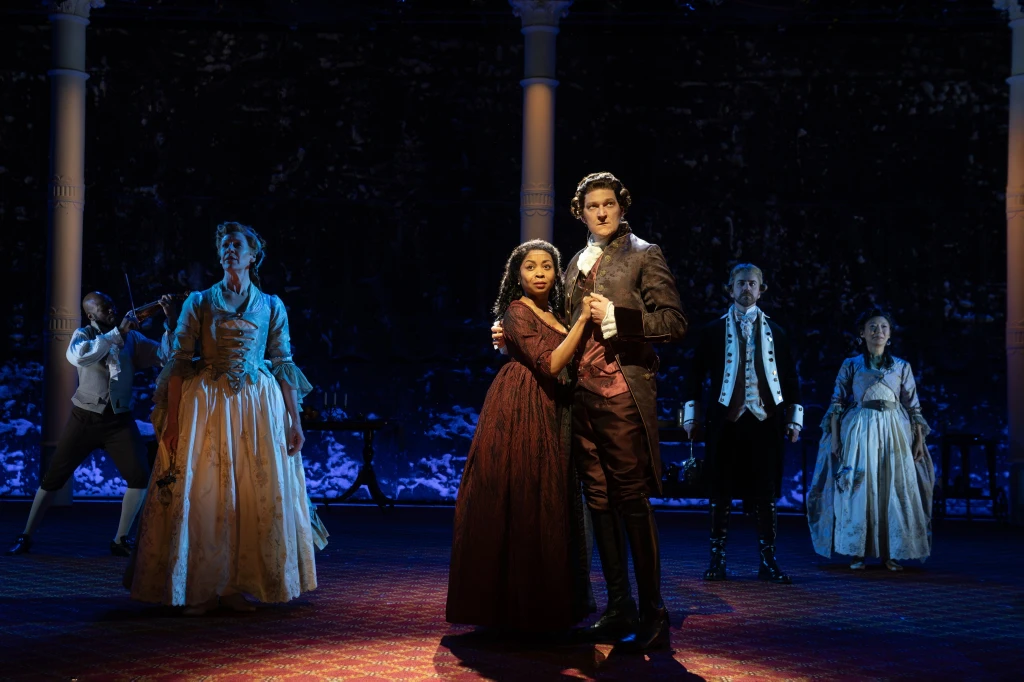
That “all humankind is created equal,” never was penned by Thomas Jefferson, nor by our most illustrious founding founders, who insured that only privileged white men with property were “equal” enough to vote. This is well noted by Suzan-Lori Parks in her satiric, New York premiere Sally & Tom, directed by Steve H. Broadnax III, currently running at the Public in its fourth extension until June 2nd.
Suzan-Lori Parks (2002 Pulitzer Prize and 2023 Tony Award winner for Best Revival of a Play for Topdog/Underdog), takes up Thomas Jefferson and fillets him for a farcical repast in this exceptional, complex new work. Examining Jefferson’s relationship with his slave mistress Sally Hemings (with whom he fathered six known children), Parks uses “their love” as fodder for her satiric cannons. She employs a play within a play structure to heighten the complexities of shedding noxious, historical, cultural notions and facing the contradictions in human behavior when attempting to do so.
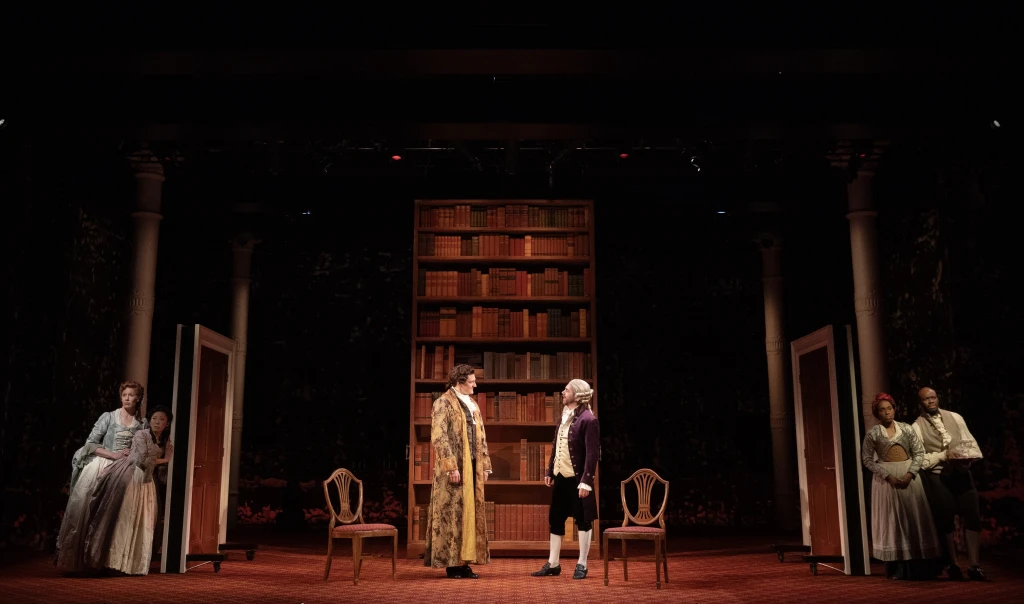
During the process, where she alternates scenes from the play Pursuit of Happiness set in the past, and the actors working backstage to rehearse, revise and reconfigure the play in the present, Parks elucidates themes about racism, slavery, the patriarchy and power domination. Gradually, she reveals how the actors, and three of the technical team realize that these elements permeate their cultural attitudes in their own lives, despite their assumptions that they’ve released themselves from such bondage. Parks’ intention is for us to identify with the Good Company’s enlightenment and self-awareness toward a new “freedom.” Finally, Parks uses the occasion to expose fascinating information about “Sally and Tom” that the audience may not have known before.
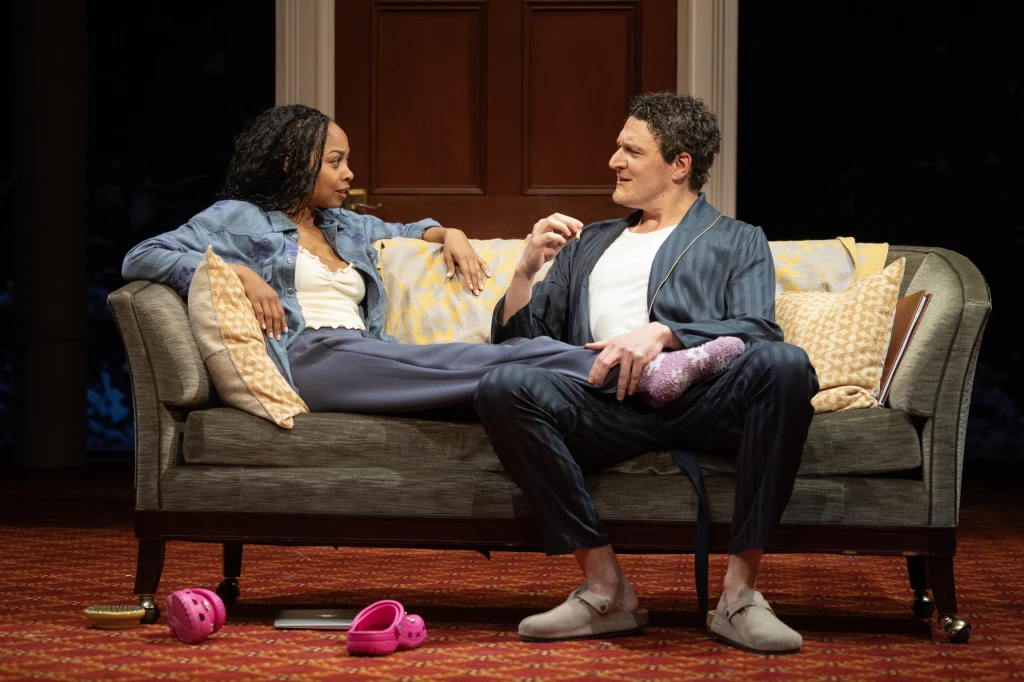
Taking cues from Parks’ dialogue, Broadnax III’s setting leaps seamlessly as it alternates back and forth from 1790, Monticello, Jefferson’s plush home where the play, Pursuit of Happiness predominately takes place. Then Sally & Tom shifts to the present, backstage, and in the apartment of actors and lovers, Mike, the director, who plays Jefferson (Gabriel Ebert), and Luce, the playwright, who plays Sally (Sheria Irving). Like the characters they portray, Mike and Luce are intimate partners in their lives. Like Sally Hemings, Luce discovers she’s pregnant during the course of reworking and acting her role in the Pursuit of Happiness.
As a humorous, Mark Twain-like ironist, Suzan-Lori Parks sends up the cliche that truth in life is stranger than fiction, as the parallels between Sally and Tom and Mike and Luce blow up by the conclusion.
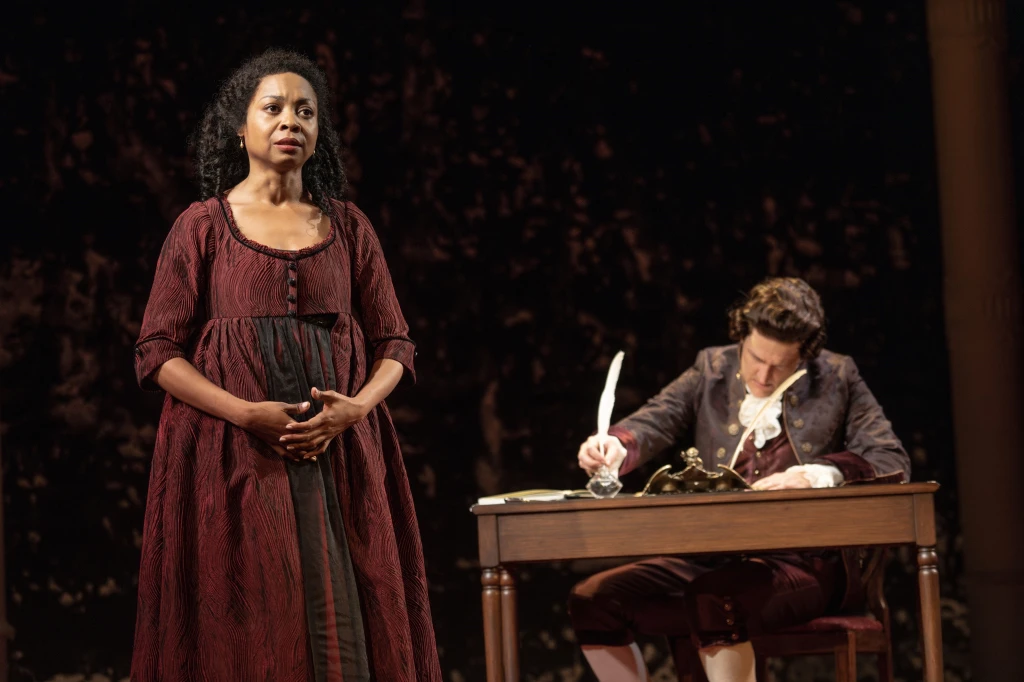
Broadnax III’s technical team crafts the sets (Riccardo Hernandez), costumes (Rodrigo Munoz), hair, wig, and make-up (J. Jared Janas & Cassie Williams), lighting (Alan C. Edwards), sound (Dan Moses Schreier), and music (composers-Parks and Dan Moses Schreier), to clarify when and where the action is unfolding. As the actors wrangle with increasingly desperate and funny problems, putting on the performance about Jefferson and Hemings, all of the characters/actors have different goals in their own pursuits of happiness. We get to see some of them blossom and others implode.
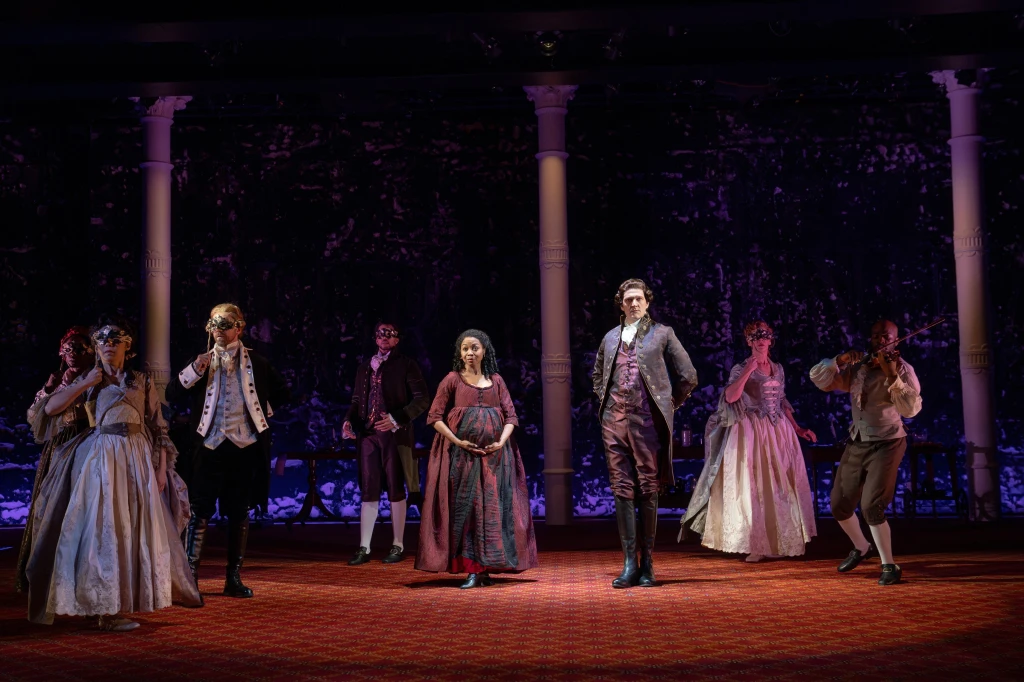
The enjoyment of Parks’ delightfully meaningful work is that one becomes immersed in both the Monticello past and the backstage present. The illusion of Jefferson’s Montocello is recreated at the top of the play as Tom and Sally dance the minuet accompanied on the violin by the slave, Nathan-actor counterpart Devon (Leland Fowler), as guests regaled in period clothes and wigs, enjoy their turns around the dance floor. As Parks exposes the colonial, repressive, anti-democratic culture of that time and stands it on its head in Pursuit of Happiness, she twits the current politically skewed theater trends presenting upbeat, nonthreatening productions, which offer “talk backs” when subjects skirt the edges of “triggering,” in order to “work through” potentially offended audience sensibilities.
Indeed, the actors of Good Company have changed their attitude toward offending audiences in this latest play to “stay alive,” and keep their company solvent. Good Company has been stretched to its limits in the past because audiences have rejected their “in-your-face” productions like “Listen Up, Whitey, Cause It’s All Your Fault.” Their producer and key financier Teddy schmoozes Luce and Mike to keep Pursuit of Happiness palatable to a diverse crowd.
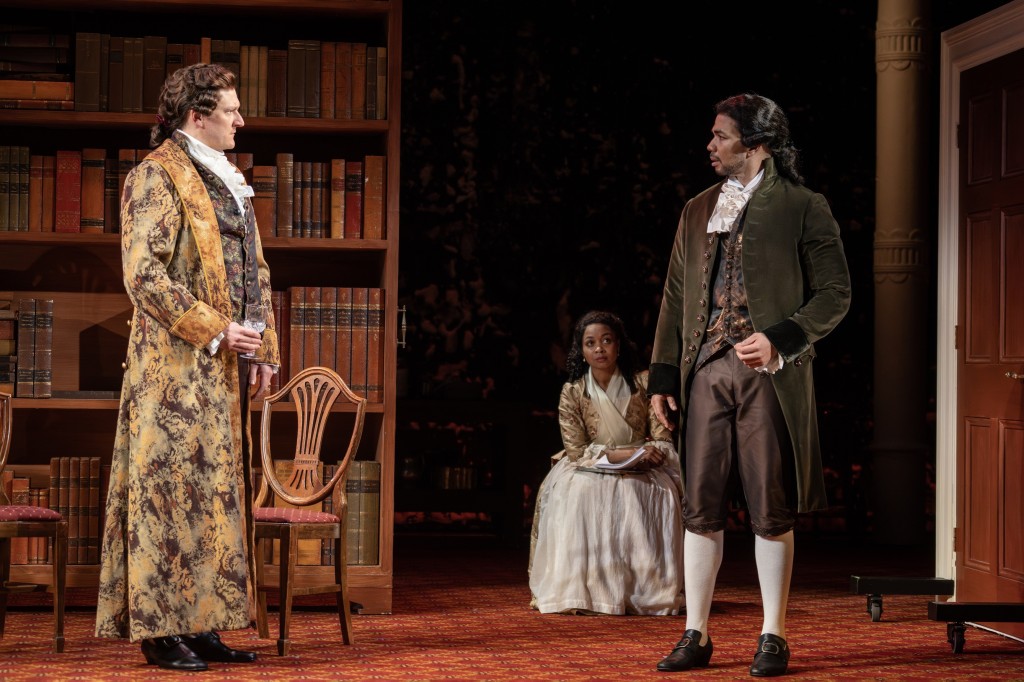
The play is heavy on accurate information. Jefferson’s “kindness” to his slaves is suggested up to a point. However, one senses the irony of a sub rosa rebellion underneath this essentially Black play which points up the scandalous “relationship” of the “good guy” Jefferson and presentation of Sally, Jefferson’s mistress, who gently gestures to her baby bump at the end of the play. Theirs was no love relationship, Luce, the playwright insists.
As the playwright Luce and director Mike rework various scenes, put in and take out inflammatory speeches, and try the patience of their producer, who eventually quits because the play is still too “in your face,” they evolve in their understanding. They are forced to modulate their impulses which reflect the present.
Some of the actors, prefer to show that the oppressed slaves had agency. In one instance, a beautiful speech is so incendiary, Teddy wants it to be removed because then, the play would be a hit and “sell,” and he’d get his money back, obviously. The point is made that during Jefferson’s time, a slave’s agency would be construed as an act of rebellion and punished with death.
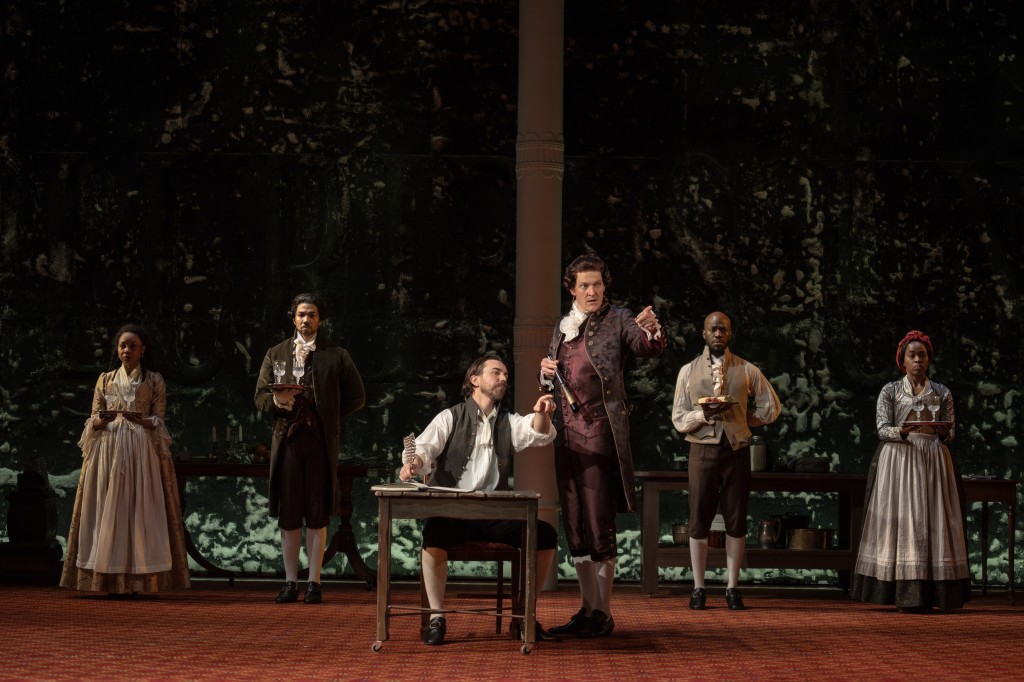
The tension between what was (the oppressive horrors of slavery), and what is (current cultural freedom especially in New York City), rocks Kwame (Alano Miller), who is on the verge of “making it” in the business. Kwame portrays Sally’s brother James, who Jefferson promised to free when they returned from Paris, where James enjoyed freedom as the other Blacks did. However, when Jefferson et. al. return to Virginia where slavery is the law of the land, Jefferson makes excuses about freeing James, because why would he do what is illegal and frowned upon by the society of his plantation peers?
James continually confronts Jefferson about his promised freedom, and stands up to Colonel Carey portrayed by Geoff (Daniel Petzold), who refers to Sally, his sister, as a “fine animal.” When Jefferson “mildly” rebuffs James telling him to “remember himself,” James holds forth in a three minute speech which producer Teddy insists must be cut.
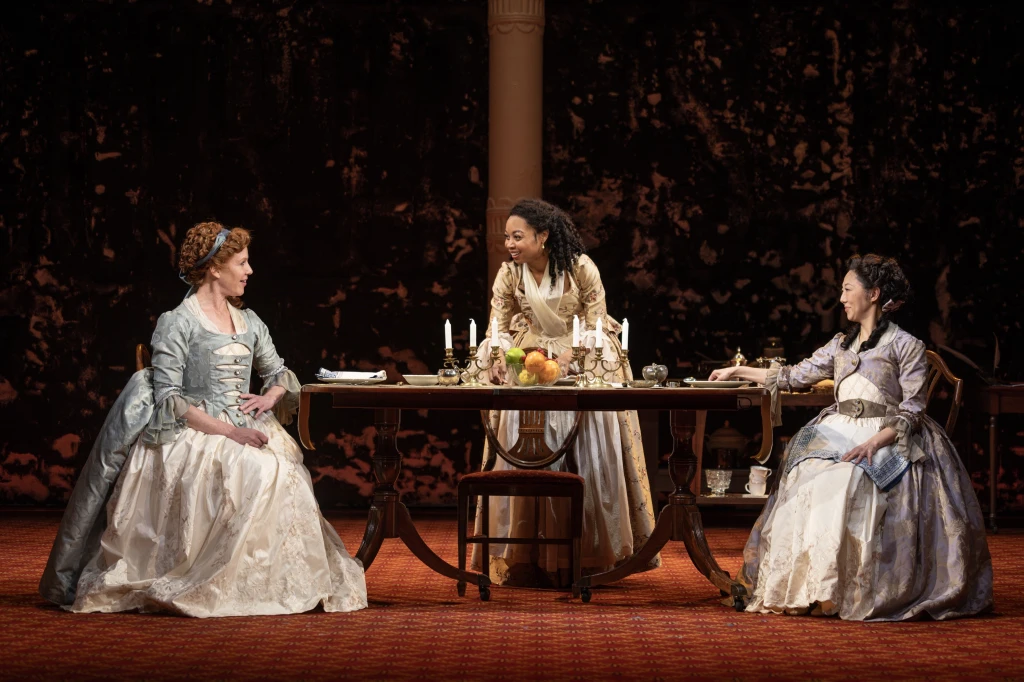
As brother James, Kwame enjoys speaking truth to power, though it is completely ridiculous for the 1790s South. It is clear that Kwame chafes at portraying a slave and feels he must redeem himself in such a role. The speech, which he delivers to “perfection” is his shining moment. The cast initially agrees and Luce, believing that Teddy is under her power, massages the producer to keep the speech and prevent Kwame from walking. Instead, Teddy quits and Mike and Luce are left with a financial abyss to fill and a long speech which makes no sense in Jefferson and the fledgling United States’ tide of times. Of course the “full of himself” Kwame believes his empowerment speech is the only value Pursuit of Happiness has.
The show, however, does go on as Mike and Luce’s relationship is sacrificed, Kwame quits, scenes are rewritten at the last minute and the acting “troopers” pull together and get to opening night. In the process, the farce unleashes and the admixture of revelation and forgiveness but not forgetfulness wins the day for the actors, and even for Sally and Tom at the “perfect” conclusion, that a sadder but wiser Luce has written for Pursuit of Happiness.
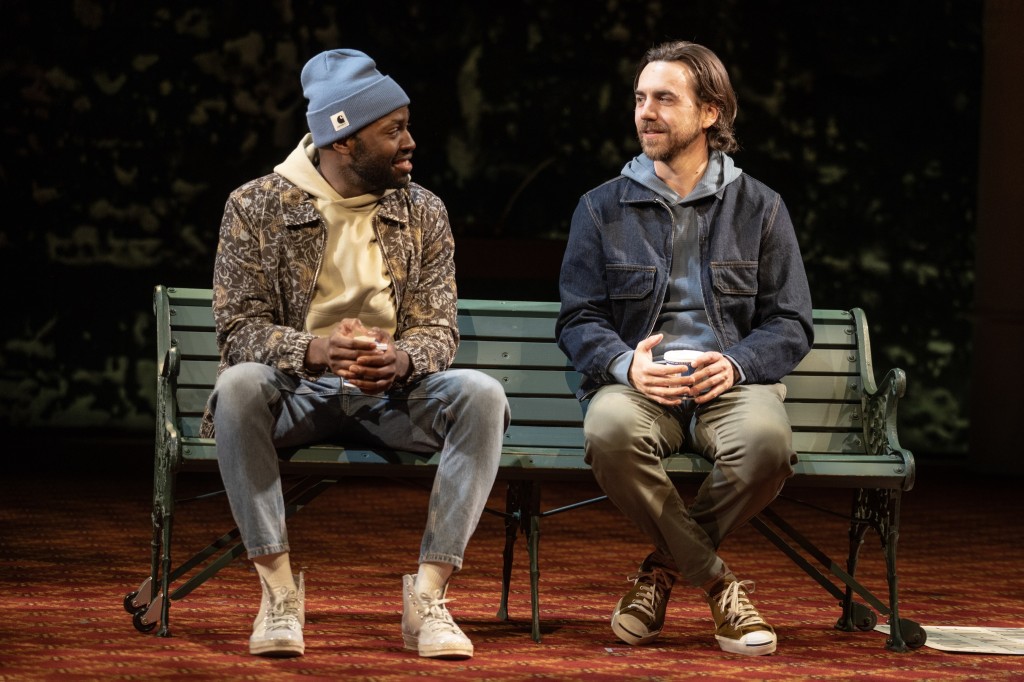
The actors are top notch in this glorious ensemble where Sun Mee Chomet, Kristolyn Lloyd and Kate Nowlin portray supporting roles. For those who gloried in founding father Thomas Jefferson’s iconic stature, Parks, speaking through Luce, pointedly suggests Sally did not love Tom. Though he supposedly was a kind master, unless one could go back in a time machine taking one’s present-day perceptions with them, it is impossible to know, given he kept 600 slaves and sold them off to raise money when he went to the Capitol, New York City. Finally, the audience is reminded that our great founding father never gave Sally her freedom. It was Jefferson’s daughter Patsy, disappointed at her father’s lascivious behavior, who finally freed Sally after Jefferson died.
If the Good Company had had their way with Teddy, who most probably insisted they change it, the title would have been E Pluribus Unum (“out of many, one”), instead of the benign Pursuit of Happiness. One would think that the implied unity has yet to be achieved in our nation, culturally fractured by foreign adversaries like Putin for politically opportunistic reasons. However, looking beyond social media posts of Marjorie Taylor Green, MAGAS, and Russian and Chinese trolls, federally, we are indeed, E Pluribus Unum, united and standing tall, while we attempt to iron out issues, as Parks points out, that are extremely complex.
Sally & Tom runs two hours, thirty-five minutes with one intermission at The Public Theater, on Lafayette Street. I loved it.
‘Stereophonic,’ Adjmi’s Hit Transfers to Broadway
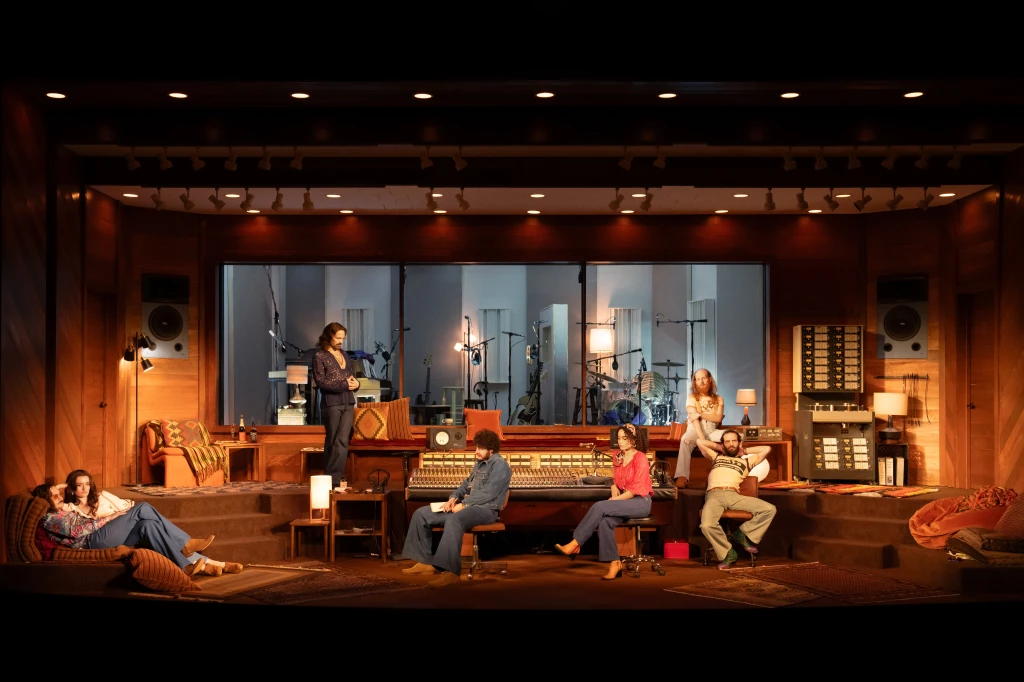
When Stereophonic opened at Playwright’s Horizons in the fall of 2023, the hybrid comedy/drama/musical was extended a number of times for a multitude of reasons. The acting was superb. The subject matter intrigued. Who is not enthralled by a smooth rock band on the cusp of greatness with a chonky financial contract, “getting their s%$t together,” as a small privileged audience watches them record their artistry in two sound studios? Under pressure, the two couple’s relationships straining, the husband-wife partners display pustules bursting with emotionalism, and the audience sees the interior of these relationships. What’s not to love?
This is live theater at its best. The audience lives moment to moment with the musicians (we have forgotten they are actors), riding to the mountain tops and canyons as we joy to their pain of creation, producing what may be a #1 album that soars to the top of the charts. In its transfer and Broadway premiere at the Golden Theatre, the cast, music, verité style, and arc of development are the same as is the three-hour length as in the original production at Primary Stages. Bravo. It is still a must-see.

Why would playwright David Adjmi (The Evildoers, Stunning), Will Butler, who wrote the terrific original music and lyrics, and superb director Daniel Aukin muck with success? The solid, winning substance of Stereophonic is about the five-member rock band and studio engineers working at an accelerated pace to record an album at two California sound studios in the mid-1970s. We get the “low-down” perspective of what it takes to be great.
Above all Stereophonic Broadway remains a stylistic masterpiece of theater verité with a view into two separate worlds, music creation and technical engineering, without which musicianship would not exist. The meld of the two in a great album reveals the dynamic genius of technicians and musicians, though the musicians are the public face who receive all the glory.
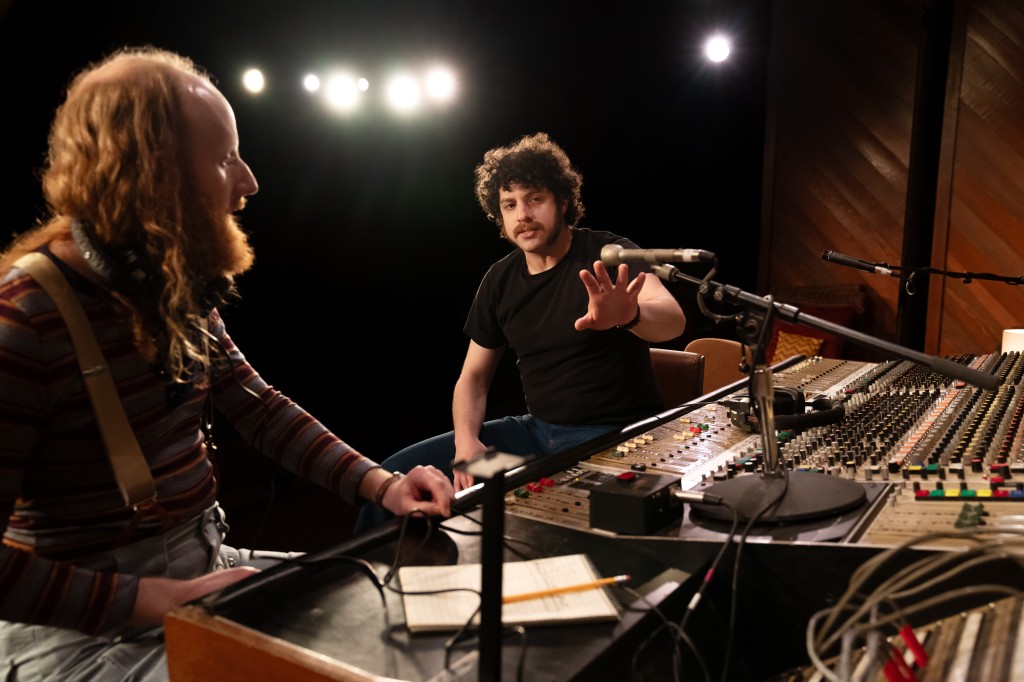
Two points to make about the production, which is integrated and fantastic from my perspective, with one suggestion. First, Stereophonic may not be understood by a “Broadway” type audience, who might not have the patience to work through the incredible detail of “moment to moment” dialogue and complications so organically constructed, intimate and authentic, that the realistic action brings one into oneself, rather than encouraging escapism in a flight of song and dance numbers characteristic of “the Broadway show.” In its brilliance, Stereophonic may not be fully appreciated for what it is. Stereophonic is a “one-of-a-kind” original that provides an electrifying evening of music creation as one would imagine happened in iconic recording studios like Muscle Shoals Sound Studio in Alabama or Abbey Road in London, perhaps, without the histrionics.
Secondly, in its staging at the Golden Theatre, a larger venue, the sound design has to be properly figured out by the designers, and the actors. They are not in a smaller venue. The actors must project, especially when their backs are turned from the audience. The sound design must be at equal level in every portion of the theater to eliminate dead spots. In the transitioning this must continue to be fine tuned.
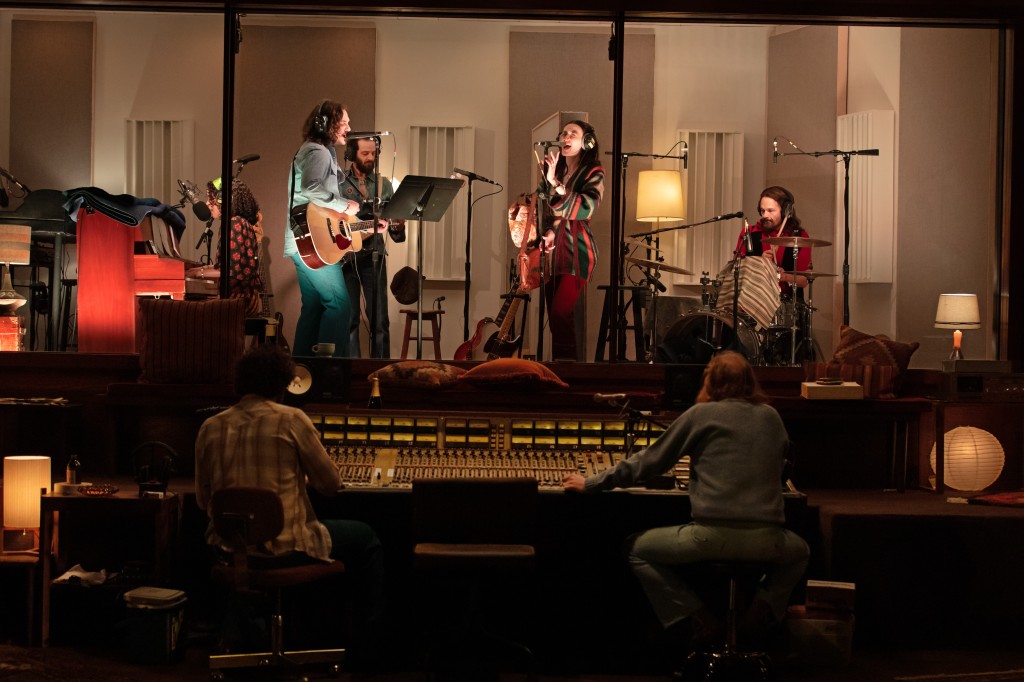
For rock fans and those fascinated by the ethereal nature of how bands collaborate, the Broadway production mesmerizes because we clearly understand the division between the musicians’ mystical artistry, which is always front and center, and the unseen, faceless, backstage engineering by Grover (Eli Gelb), and Charlie (Andrew R. Butler), who are finally revealed in process. It is the engineers’ artful techniques which enhance the overall effect and impact of each recorded song. This division of the two different realms of making music is beautifully manifested in David Zinn’s wood paneled scenic design, and Jiyoun Chang’s lighting design, which Aukin carried over to Broadway, along with Enver Chakartash’s period costume design. Robert Pickens & Katie Gell’s hair and wig design are new in this production.
As at Primary Stages, the Golden Theatre’s stage is divided into two sections. The upper level reveals the sound studio protected by glass, where we see and hear the musicians perform in a theater verité style, as they stop to revise tempos, add pauses, evolve riffs, etc. Downstage is the massive control panel where the engineers sit mostly with their backs to the audience and work to serve, manipulate, and stoke the musicians’ extraordinary talent and heightened emotional states, all the while discussing “their truth” with each other. With Aukin’s superior staging, we can track both worlds, feeling we are in their midst, interactively participating in music creation and understanding how the worlds precariously interact.
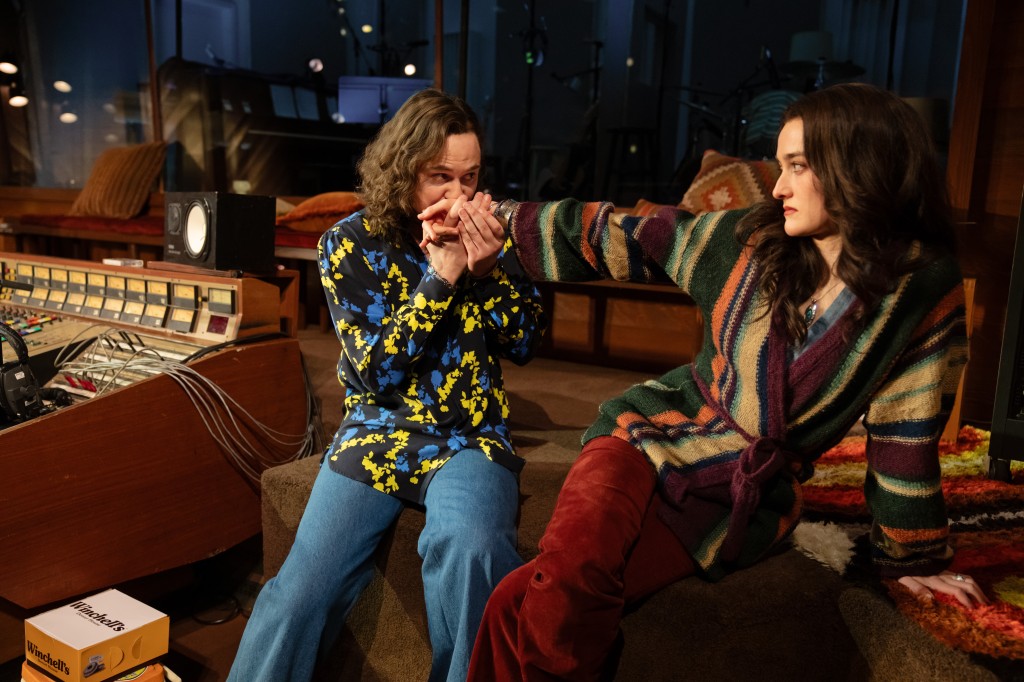
Though band members treat Grover and especially the shy Charlie as invisibles they don’t speak to, without their efforts the band’s unique identity and glorious sound wouldn’t exist. Therefore, in the production’s arc of development, Adjmi gradually uncovers the engineers’ centrality to the creative process and the band’s success. It is especially funny and poignant to witness how the engineers moderate the emotional infantilism of the “high-strung” musicians to get the recordings in top shape.
Throughout, drugs and alcohol become a panacea to quell the rough edges of sleep deprivation and stimulate a frenzied work environment. The cocaine, supplied by overworked engineers, keeps the band working at a frenetic pace. Ironically, drug use intensifies the arguments but floods the band’s creative juices.

Aukin’s vision of Adjmi’s themes of art, music, sacrifice and suffering, heighten the importance of sound engineers. They must have skill and expertise in the control room, as well as the personalities to cope with and manipulate artistic personas like druggy Reg (the hysterical and funny Will Brill), and diva Diana (Sarah Pidgeon).
For example Grover and Charlie must be temperate as Diana strains to get the notes, emotionally loses it, and must be encouraged by her partner lead musician and producer Peter (Tom Pecinka), to try again and again to “get it right.” Additionally, the engineers must be purposed to withstand the emotional word bludgeons from their “boss,” Peter, who launches off into a demeaning tirade against Grover and fires him. It is an idiotic move because Grover is the backbone of the album and Peter knows it. That is why he later makes Grover co-producer and apologizes.
The songs of Will Butler, (Oscar-nominated and former member of the Grammy-winning indie rock band Arcade Fire), remain as striking as ever. Indeed, one would wish that this band does produce an album, finishing the partial songs (we only hear a few in their entirety), that we hear them rehearse. The songs resonate with the themes of emotional yearning and the deceptions of fame, money and commercialism, the masquerade that they must avoid. If they embrace the commercialism, they will lose their way as artists, attempting to achieve perfection, a goal of the hard driving Peter.

Butler’s songs importantly reveal the raw emotions of anger and hurt, stirred by betrayal and loss that couples Reg (Will Brill) and Holly (Juliana Canfield), and Peter and Diana, experience in their relationships. Working frenetically together in close quarters to exceed the results of their previous album require sacrifice to be great. Peter constantly pushes them toward this. But by the conclusion as their work is finished, all have suffered for it. Simon (Chris Stack), who has been away from his wife and children for six months faces the threat of divorce and losing his family.
However, only Diana has been signed on to be a solo artist. Is the pain, suffering and sacrifice worth it for the others? Juliana Canfield’s Holly, a close friend and ally of Diana, congratulates her on this success. But we are left wondering if they will remain close or if the band will remain together to collaborate again?
A tour de force, Stereophonic runs over three hours with one intermission. Thanks to Adjmi, director Daniel Aukin, the sensational cast, whose acting chops and vocal talents are non-pareil, and the technical design team, the compelling forward momentum of the band’s creative dynamic resonates with powerful immediacy.
Special kudos goes to Music Director Justin Craig and Will Butler and Justin Craig’s orchestrations.
Stereophonic runs through July 7 at the Golden Theatre (252 West 45th Street, between Broadway and Eighth Avenue). www.stereophonicplay.com
‘Lempicka,’ The Art of Survival With a Paintbrush
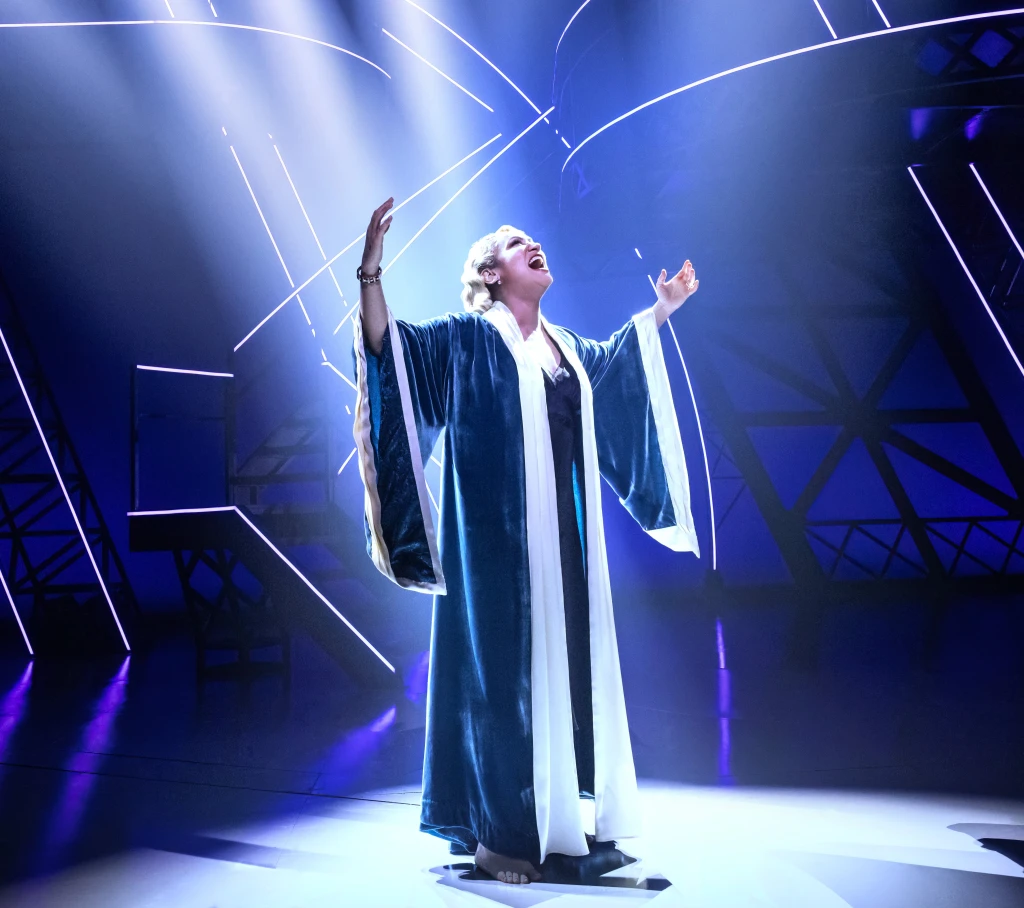
Loosely inspired by tumultuous events in the life of Tamara de Lempicka, which gave rise to her provocative oil paintings of high society portraits and nudes in an Art Deco style, the musical Lempicka magnifies the theme of femininity unbound. The “unbound female” is a marvelous theme, perhaps annoying to some male critics, but welcome to most women, who have been undervalued and diminished throughout history. The expressive, glamorous and impassioned Eden Espinosa stars in the titular role. The premiere currently runs at the Longacre Theatre until September.
With the book, lyrics and original concept by Carson Kreitzer, and book and music by Matt Gould, this sensational, must-see musical is directed by Rachel Chavkin, who shepherds a superb creative team. The director effectively stages the action with her signature, fast-paced forward momentum. Minimalist, geometrically shaped scenic design elements and stylized ironwork scaffolding (Riccardo Hernandez’s design), adapt to the various settings. Thanks to the effective use of light and color (Bradley King), sound (Peter Hylenski, Justin Stasiw), and Peter Nigrini’s projections, the combining elements symbolize the cultural and historical references to the musical’s settings in Russia, France, and the United States.
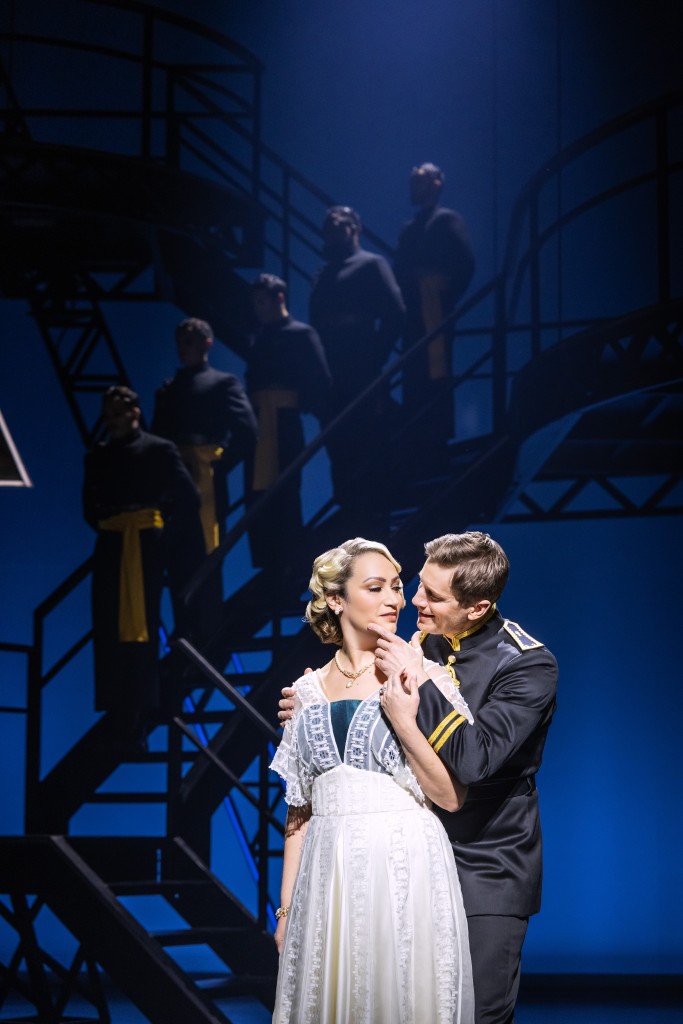
Choreographed by Raja Feather Kelly, the amazing music is arranged and supervised by Remy Kurs. Lempicka reveals an incredible female artist, whose works Madonna and Barbra Streisand have purchased.
Chronicling the artist’s journey in flashback, Lempicka opens with a musical pop flourish to reveal an elderly woman sitting on a bench, “painting” en plein air, sans paints and canvas. Under the wide brimmed hat, Lempicka (“Unseen”), reminisces about her former glorious European life. Now, an “old woman that doesn’t give a damn; that history has passed her by,” she asks, “How did I end up here?”
The question is readily answered. She sheds her “old lady digs,” (Paloma Young’s costume design), and steps back into the past, transformed into a lovely, young woman, in a shining white wedding dress. It is the happy day of her marriage to wealthy Russian aristocrat, Tadeusz Lempicki (golden voiced Andrew Samonsky).
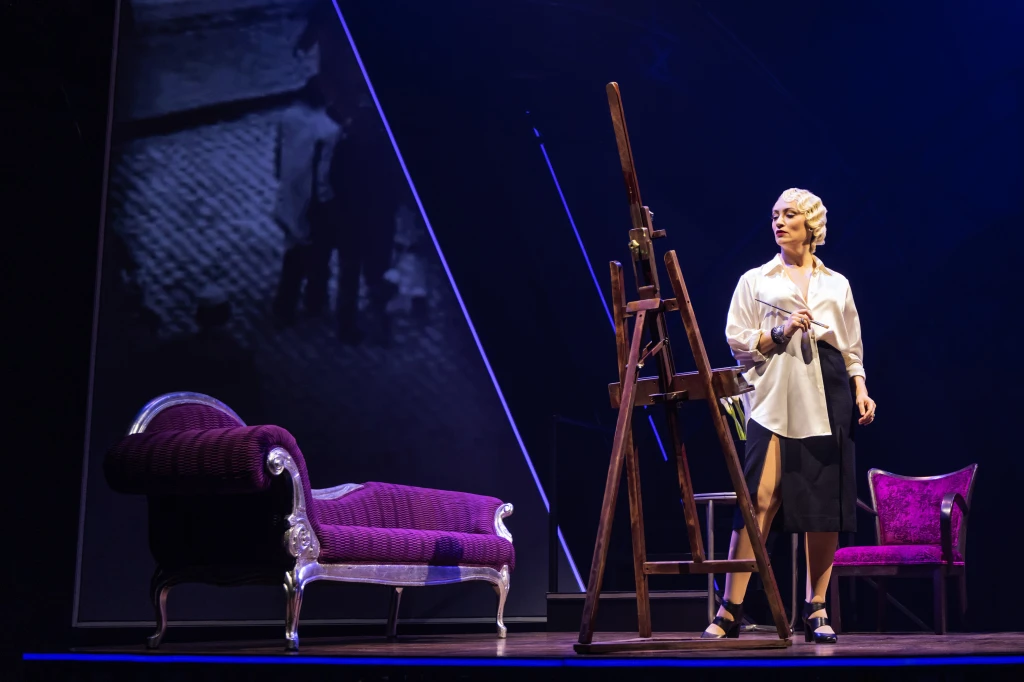
In a flurry of action in the next scenes, with jarring lighting, sound and bellicose revolutionaries, the Russian Revolution storms onstage (“Our Time”). Officials arrest Tadeusz, boasting that now everyone is like everyone else. Kreitzer and Gould’s book reveals Lempicka’s steadiness and presence in the moment, as she uses jewels and her body to save Tadeusz and baby Kizette. (The older Kizette is played by Zoe Glick.)
Within her heart and soul, Lempicka, a survivor with flexibility “in season and out,” converts the violence, oppression, and trauma of losing everything, into the building blocks of a unique artistic expression. After the family arrives in Paris as destitute refugees, with Tadeusz useless and despondent, she forces herself to paint for their subsistence.
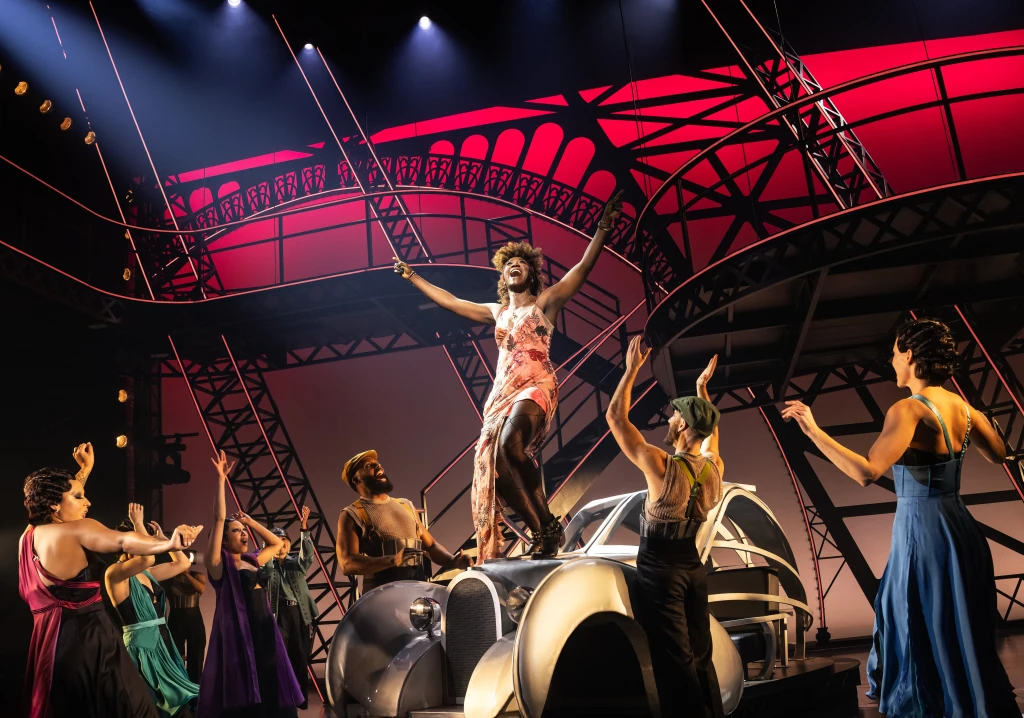
Clearly, her experiences shape her art, and Chavkin’s vision, beautifully executed by her creative team, subtly ties the two together. Lempicka infuses her work with hints of her sexually frenetic lifestyle during the Anneés Folles in Paris, through the depression to 1939. Guided by her futurist teacher Marinetti (the superb George Abud), the art instructor insists “we are sober broken creatures; we need art that speaks to us now” in “the age of the machine” (“Plan and Design,” “Perfection”). Striking out in her own direction, employing some of his suggestions, Lempicka creates exquisite, tonal melds of steely, cool sensuality to convey her “larger-than-life,” shimmering, women subjects.
As her prime muse, she paints her lover Rafaela, the phenomenal Amber Iman, whose thrilling voice is sultry and seductive (“Don’t Bet Your Heart,” “The Most Beautiful Bracelet,” “Stay”). Despite Rafaela’s intentions “never to love,” they couple in an intense relationship that spurs Lempicka’s creativity to expand her chic brand. Rafaela helps her to forever solidify her iconic, ravishing, sensually bold artistry of women nudes and portraiture.
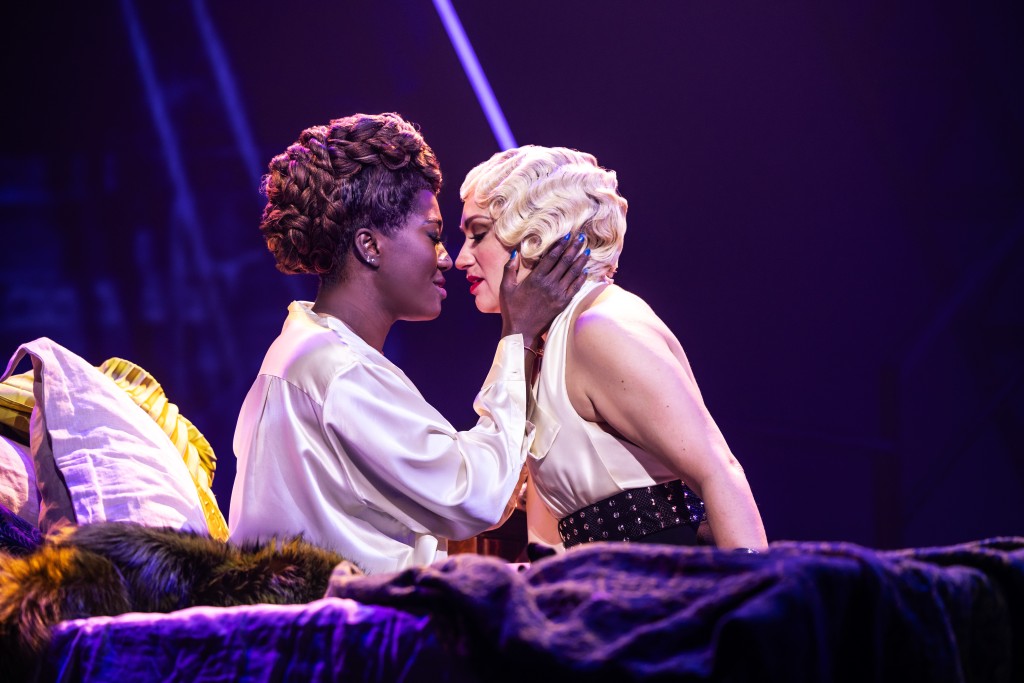
Her subjects bridged the worlds of Café Society and the underbelly of Paris’ open sexuality, represented by the Club Monocle, owned by audacious, bon vivant, Suzy Solidor (Natalie Joy Johnson). There, forbidden love and entanglements are encouraged because payoffs to the authorities allow such entertainment to flourish (“Women”).
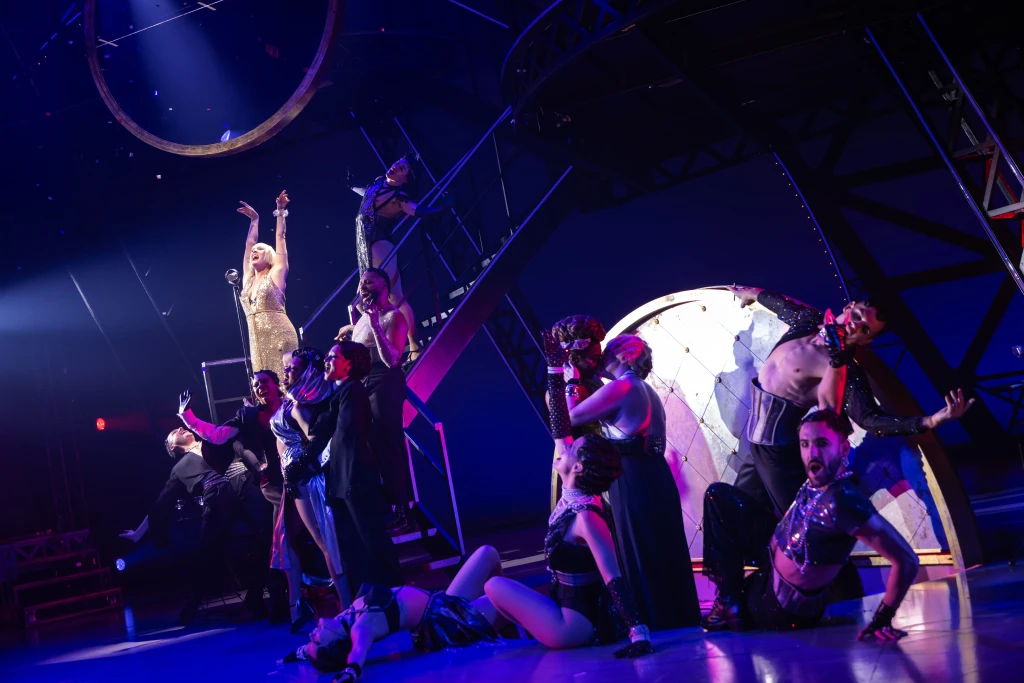
In the opening scene’s moment of reflection, Lempicka says she, “loved more than life itself,” and specifically loved two people at the same time. They are Tadeusz and Rafaela. In an exceptional moment, they meet at Lempicka’s exhibition and sing “What She Sees.” Iman and Samonsky sing the ballad with gorgeous, resonating power.
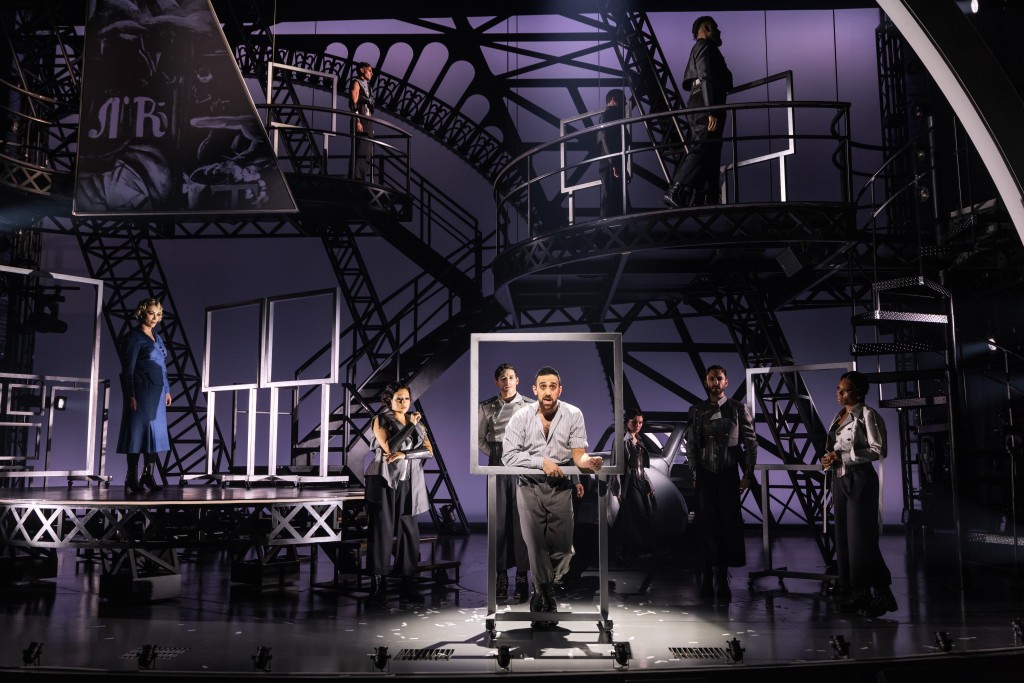
As the Black Shirts, joined by Marinetti, flood the forbidden cultural spaces of Paris with intimidation (“Here it Comes,” “Speed”), they destroy Suzy’s club. The center does not hold, and Paris begins its transition to fascism’s conservative allure banning “decadence.” Lempicka’s life in Paris disintegrates. The operatic powerhouse number, “Speed,” is particularly striking as Tamara, Rafaela, Marinetti, Tadeusz emotionally convey the upheaval in their lives. Circumstances force them to rapidly spiral away from each other.
In a vital scene, Beth Leavel’s Baroness asks Lempicka to paint her for her husband’s remembrance. She is dying of cancer and encourages Lempicka to be with the Baron (Nathaniel Stampley), who is also her agent and an art collector. The way will be clear for Lempicka, divorced from Tadeusz at his insistence, because he can’t abide by her alternate lifestyle.
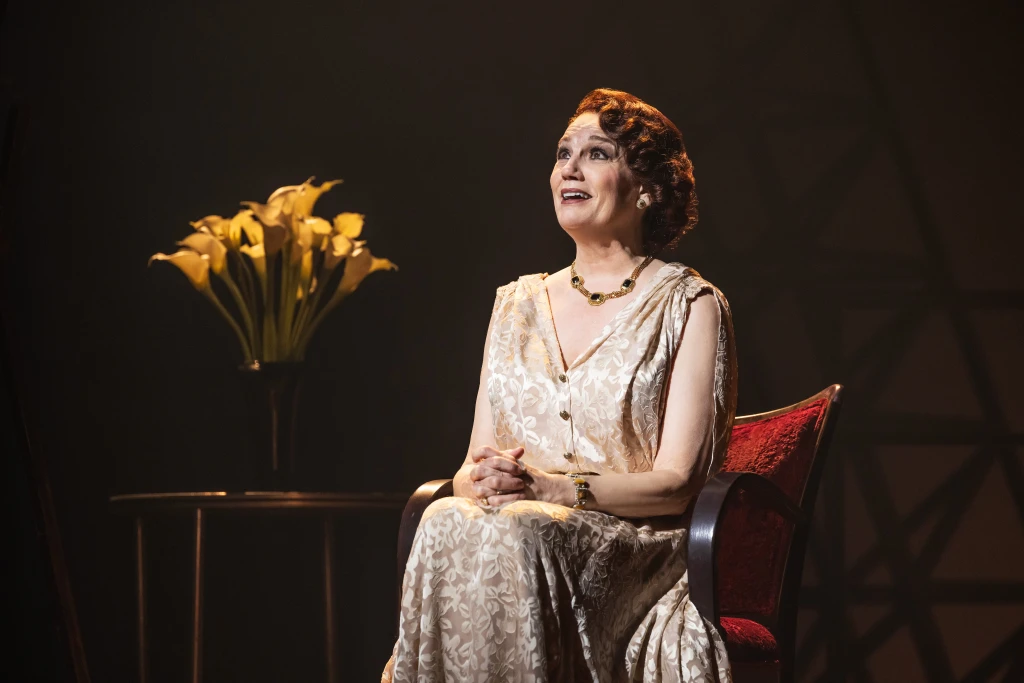
In “Just This Way,” Leavel’s pitch-perfect, full-throttled power brings down the house. Though the part is small, Leavel makes it loom gloriously. In the Baroness’s dying is the intensity of her desire to live forever in Lempicka’s incredible art.
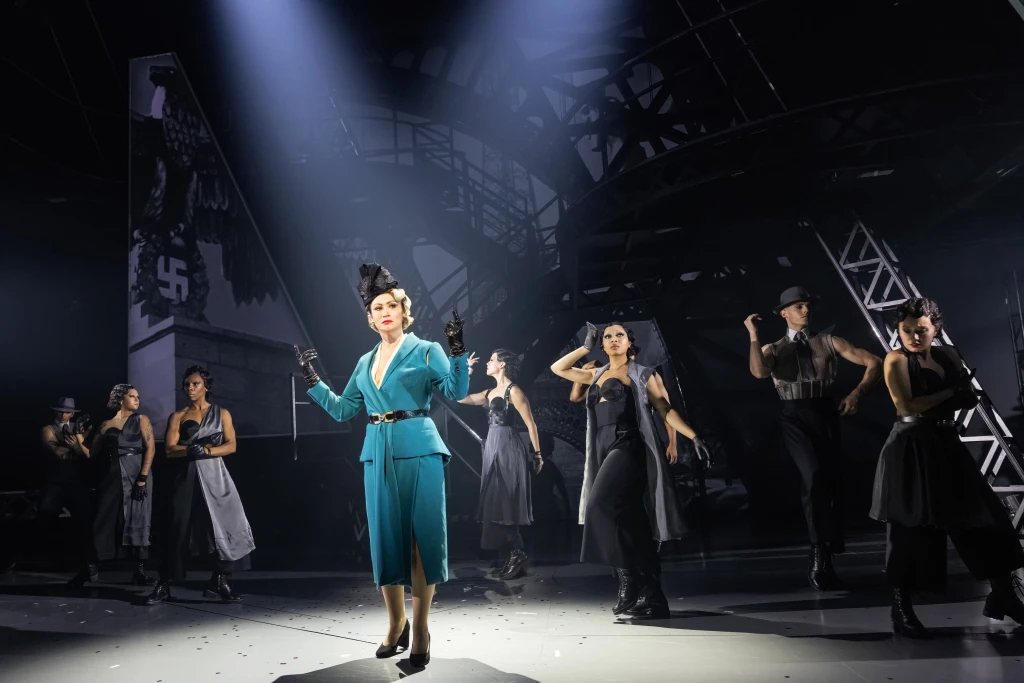
When Lempicka and the Baron presciently flee Paris in 1939 ahead of the Nazi occupation, Lempicka forever leaves the philosophy, culture and wild personas that engendered her most appealing works. She settles into oblivion in Hollywood, as the flashback of her European life closes. At the conclusion, she sits “In the Blasted California Sun,” haunted by memories of Rafaela, who disappears, but like all those from her past, lives on in Lempicka’s artistry (“Finale”). Today, Lempicka’s paintings are worth millions.
Lempicka. Two hours, thirty minutes with one intermission. Longacre Theatre, 220 West 48th Street between Broadway and 8th Avenue. https://lempickamusical.com/
